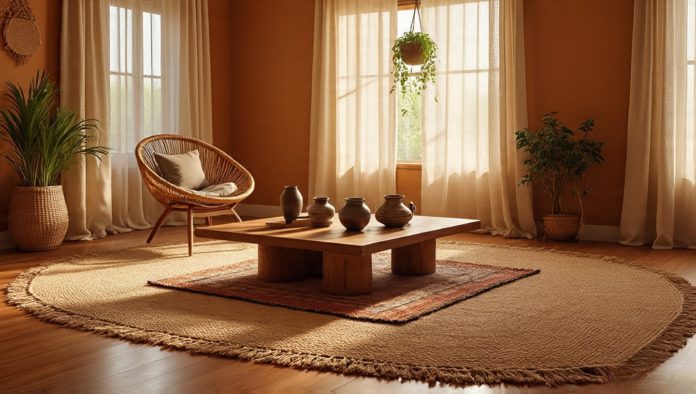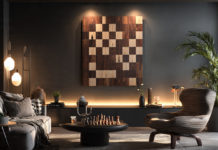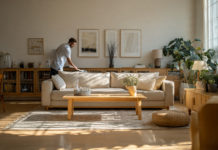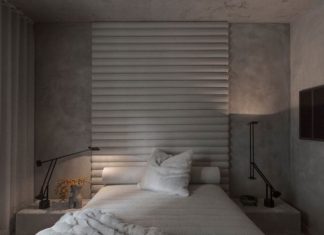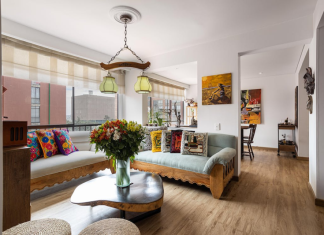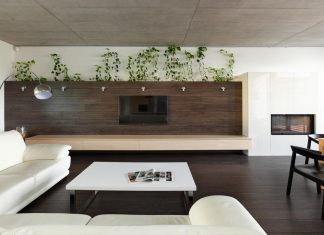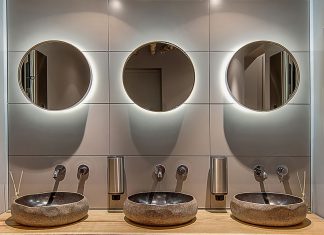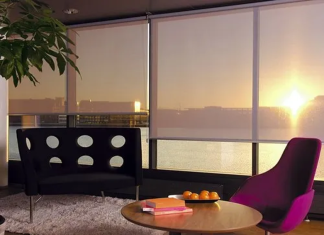Roohome.com – Bohemian style is one of those design approaches that feels less like decorating and more like storytelling. It’s messy but beautiful, layered but comfortable, and always a little personal. When I first swapped my plain beige rug for a woven Moroccan piece, the entire living room felt alive like someone had finally turned the lights on, even in daylight. That’s the magic of Boho. It’s not about following rules. It’s about collecting memories, colors, and textures that make you feel at home.
1) Layered Rugs That Tell a Story (and Fit the Room)
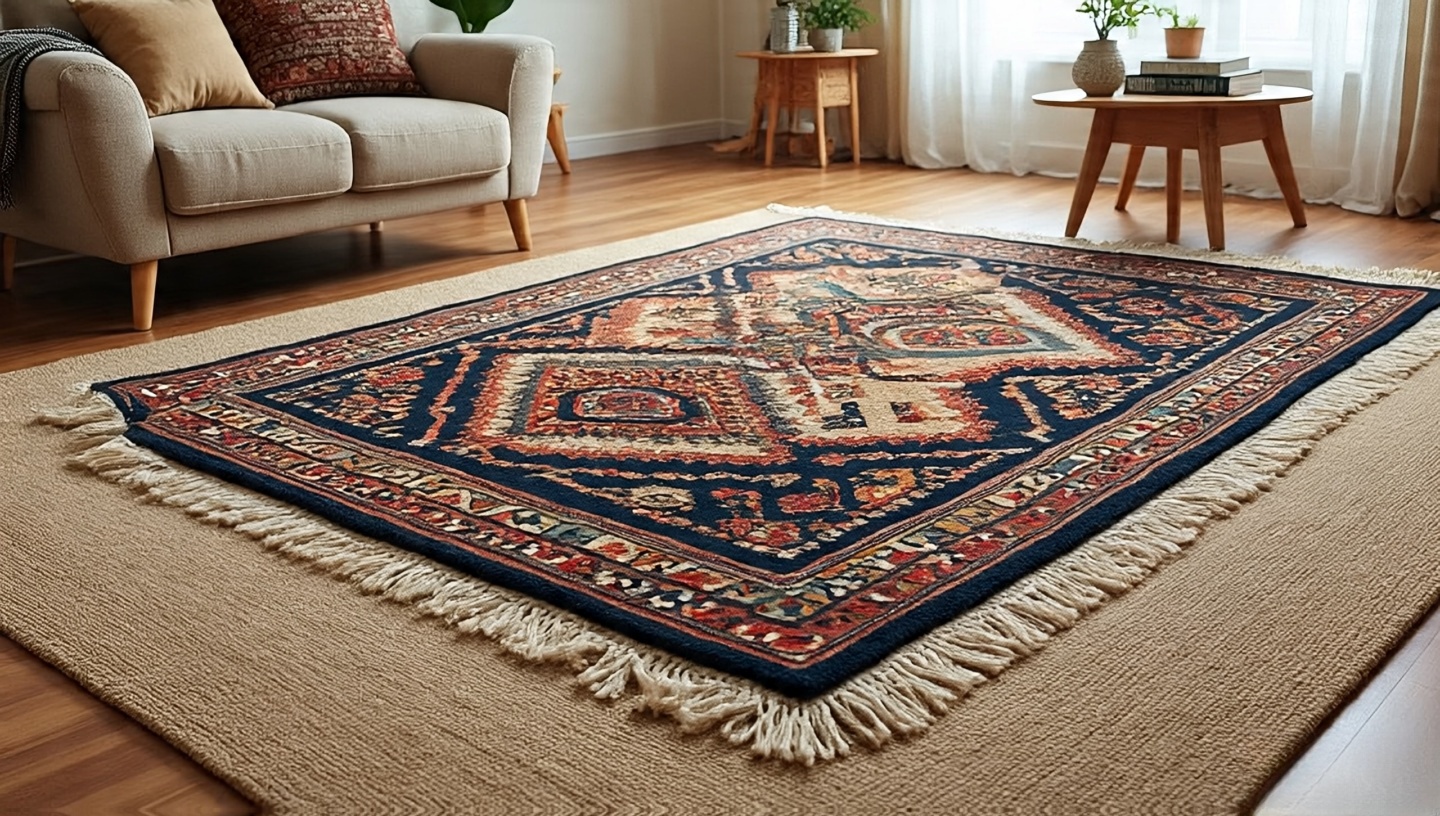
- Sizing rule of thumb: Let the base rug run under the front legs of all key seating. Target a border of 20–30 cm (8–12 in) from the outer furniture edges.
- Layer ratio: Top rug ≈ 60–70% the width of the base. Contrast either texture (jute under wool) or pattern (quiet under bold) not both at once if your room is small.
- Grip & safety: Use a felt-rubber pad under the base and a low-profile waffle pad under the top to avoid drift and curling corners.
- Edges: If the top rug has a thick fringe, float it away from walk paths to reduce wear.
Architect’s note: Layering is a composition exercise. Stand on a chair, photograph the layout, and check the balance from a bird’s-eye view. Your eye catches misalignments faster that way.
2) Plants, Plants, and More Plants Arranged Like a Mini Forest
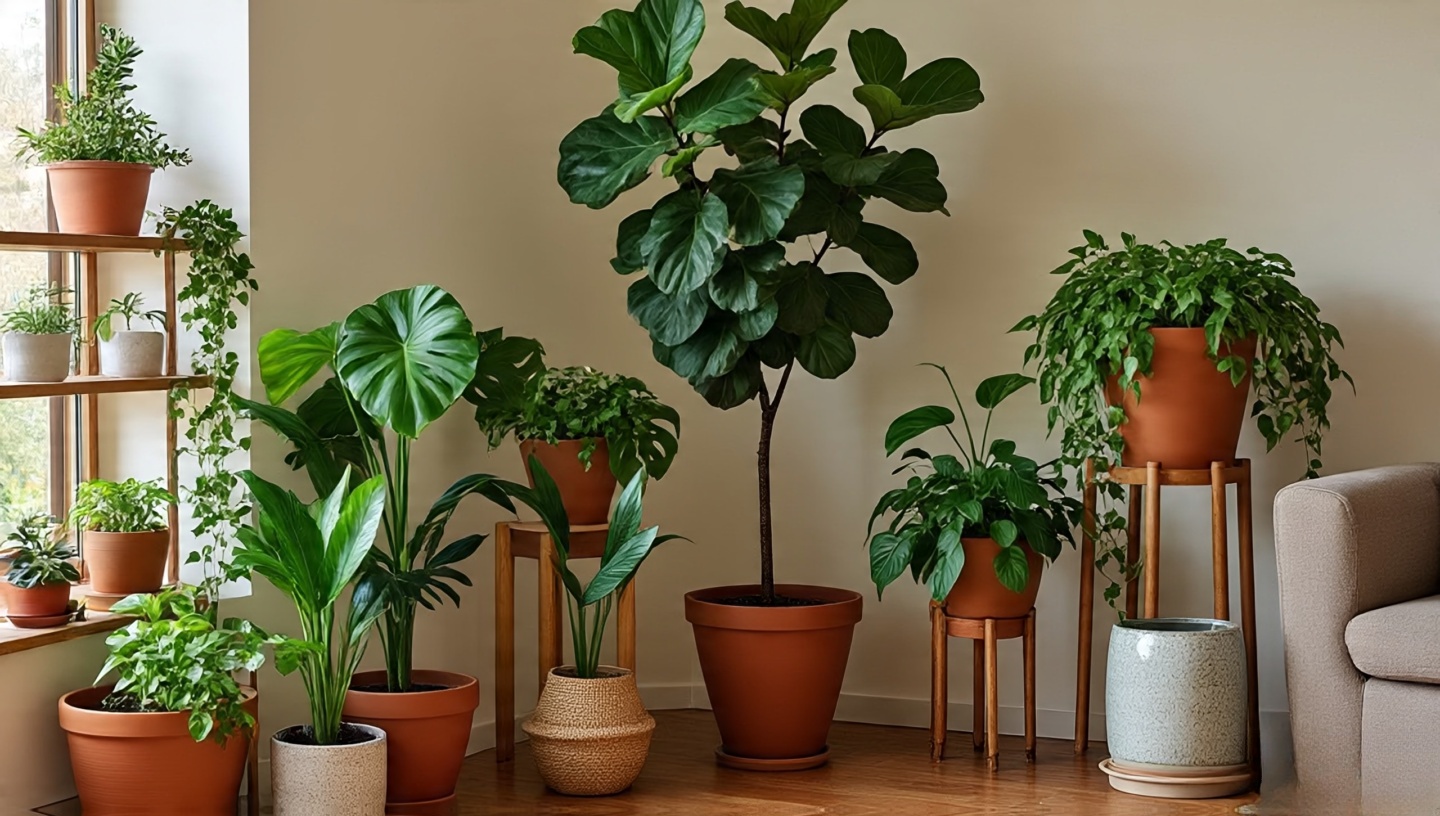
- Canopy (large): 1 statement plant (e.g., fiddle leaf fig, rubber tree) at 180–220 cm tall to anchor a corner.
- Mid-story: 2–3 medium plants (monstera, snake plant) at different heights on stools or stands.
- Understory: small pots (succulents, pothos) to spill and soften edges window sills, shelves, coffee table.
- Light logic: East windows = gentle morning light; West = stronger evening light; South (N. Hemisphere) / North (S. Hemisphere) = brighter all day. Place thin-leaf plants closer; thick, waxy leaves can sit a bit deeper.
- Material tip: Terracotta breathes (good for over-waterers). Glazed pots retain moisture (good for forgetful waterers).
Common mistake: Too many pots on the floor narrows walk paths. Keep a clear 90 cm (36 in) circulation zone.
3) Wicker & Rattan: Warmth Without the “Beach Rental” Look
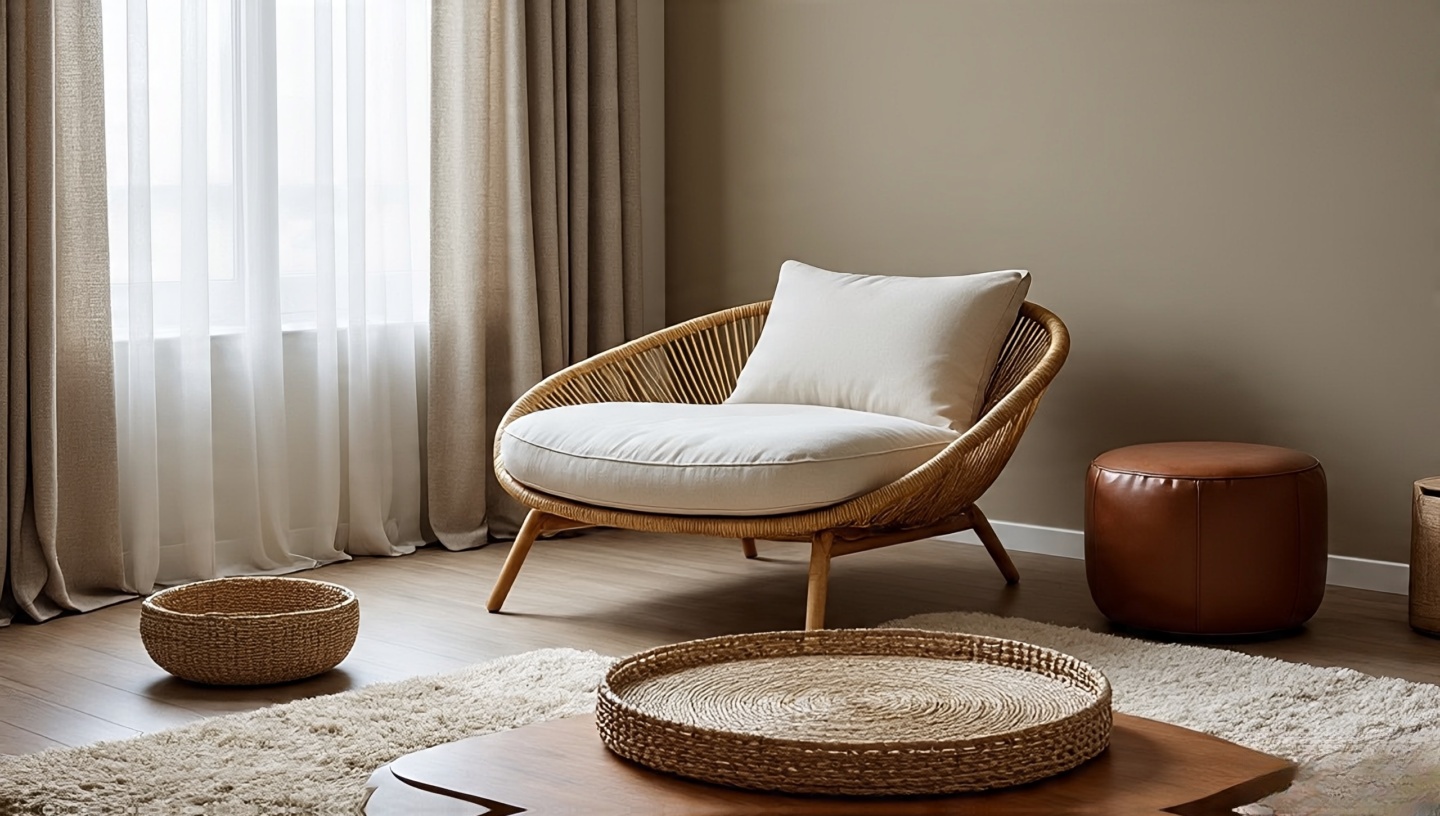
Quick spec:
- One rattan hero (chair or pendant) + two smaller woven accents (basket, tray) is usually enough for a medium room.
- Seat comfort: aim for 5–8 cm cushion thickness; add a lumbar pillow to avoid “perch fatigue.”
- Care: keep out of direct, harsh sun to prevent brittleness; wipe with a slightly damp cloth and dry thoroughly.
Architect’s note: Pair rattan with grounded materials thick wool throws, leather ottomans, or a chunky timber coffee table to avoid a flimsy feel.
4) Macramé Magic Scale, Height, and What to Pair With It
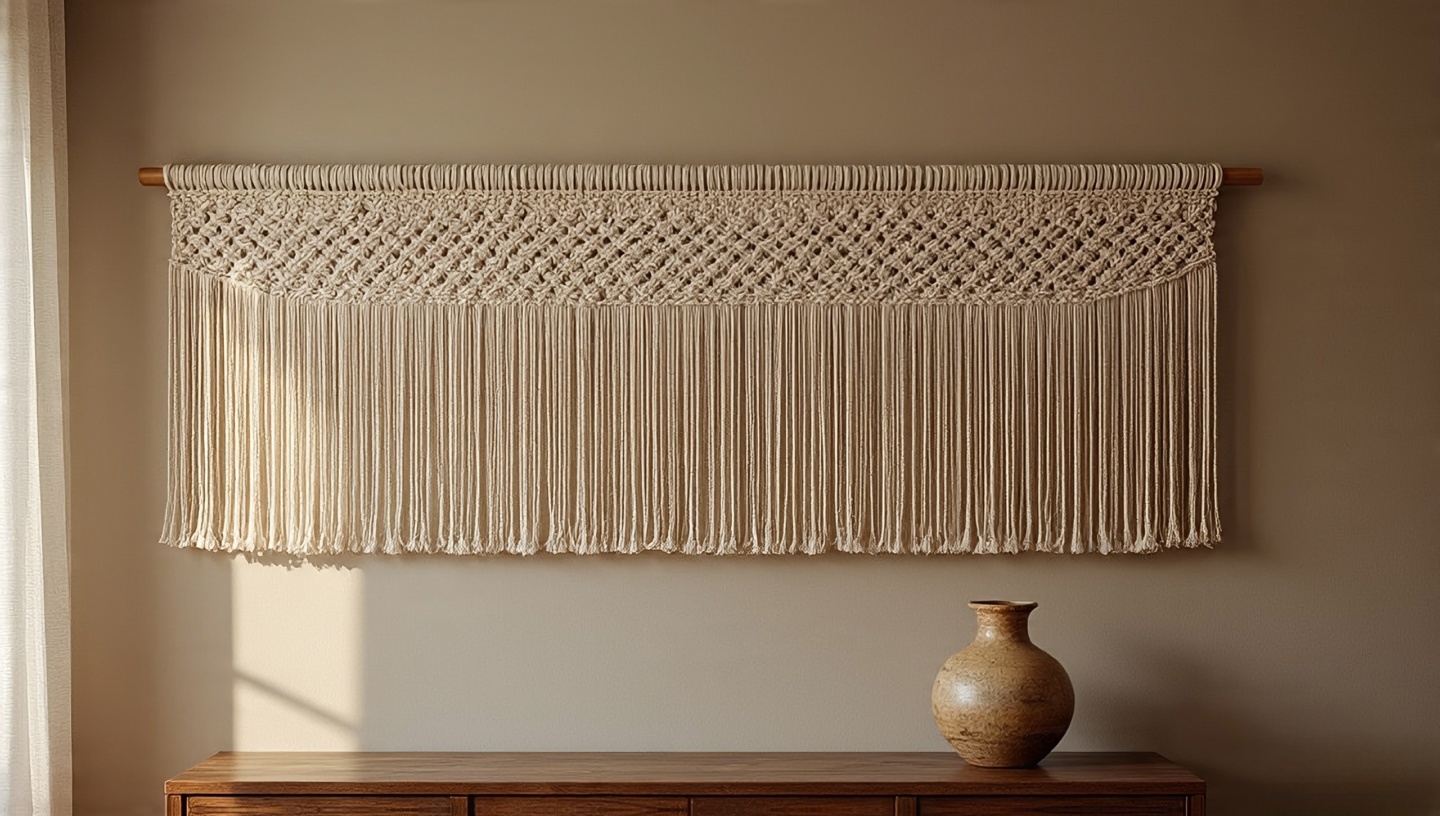
- Width: Choose a piece at 40–60% of the wall section it occupies so it reads intentional, not accidental.
- Height: Bottom edge should sit 30–45 cm (12–18 in) above a console or headboard to breathe.
- Pairing: Layer with sheer curtains on adjacent windows to echo the vertical strands; add one solid, earthy element (clay vase, timber shelf) nearby for contrast.
Touch matters. Macramé only sings when the fiber feels substantial. If it looks limp, upgrade the rope weight.
5) Low-Level Lounging: Build a Conversation Nest
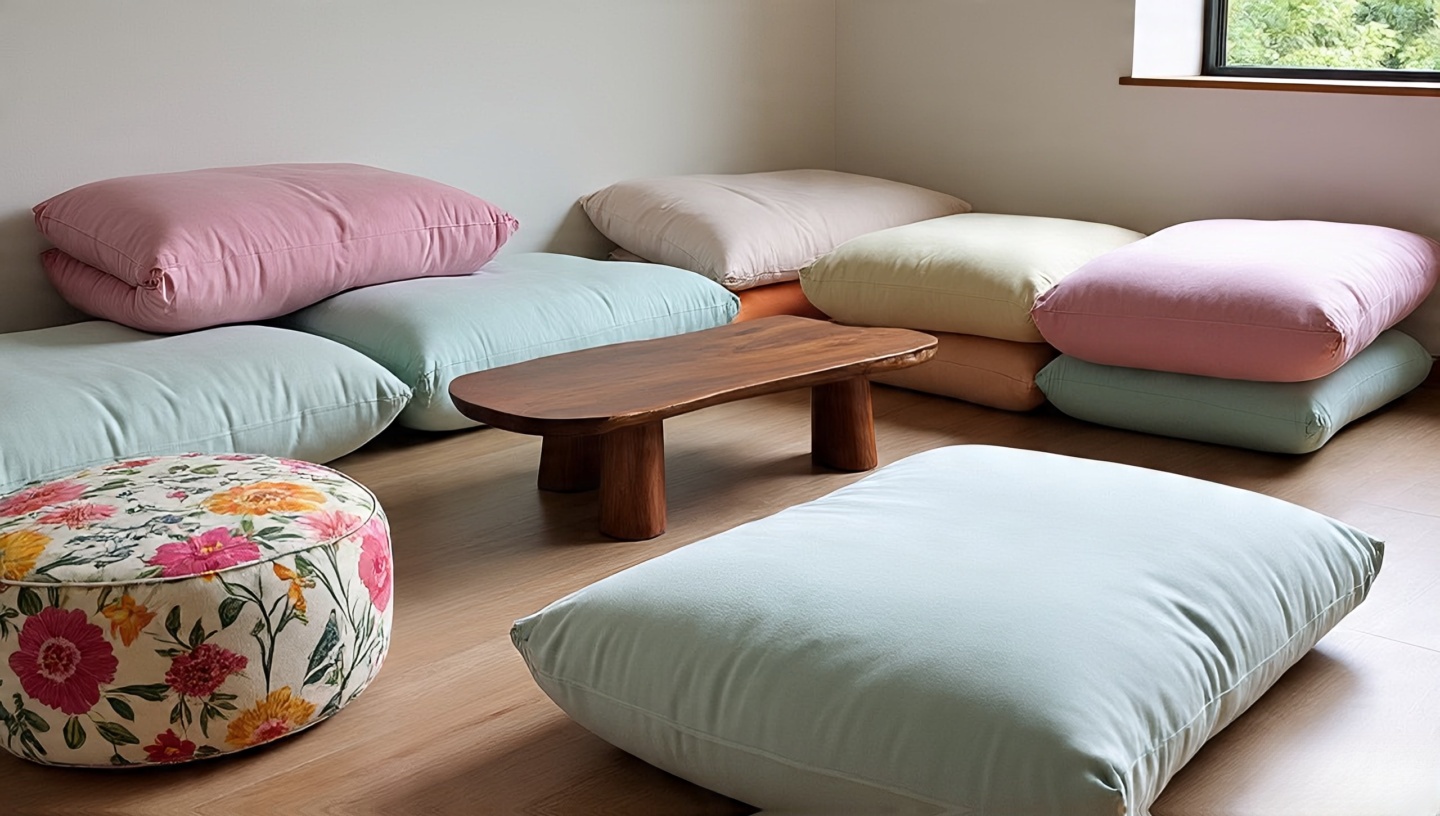
- Ergonomics: Target a seat height of 30–40 cm (12–16 in). Stack two thin cushions rather than one overly plump one for better knee angles.
- Zoning: Place a low table (top at 30–35 cm) within easy reach of every seat; perimeter stools double as side tables.
- Circulation: Maintain that 90 cm clear path; low rooms get messy quickly if you compromise walk lines.
Pro move: Use a thin platform (ply on short legs) under a cushion cluster to visually anchor the zone without visually shrinking the room.
6) Candles & Lanterns: Layer Light Like an Evening Market
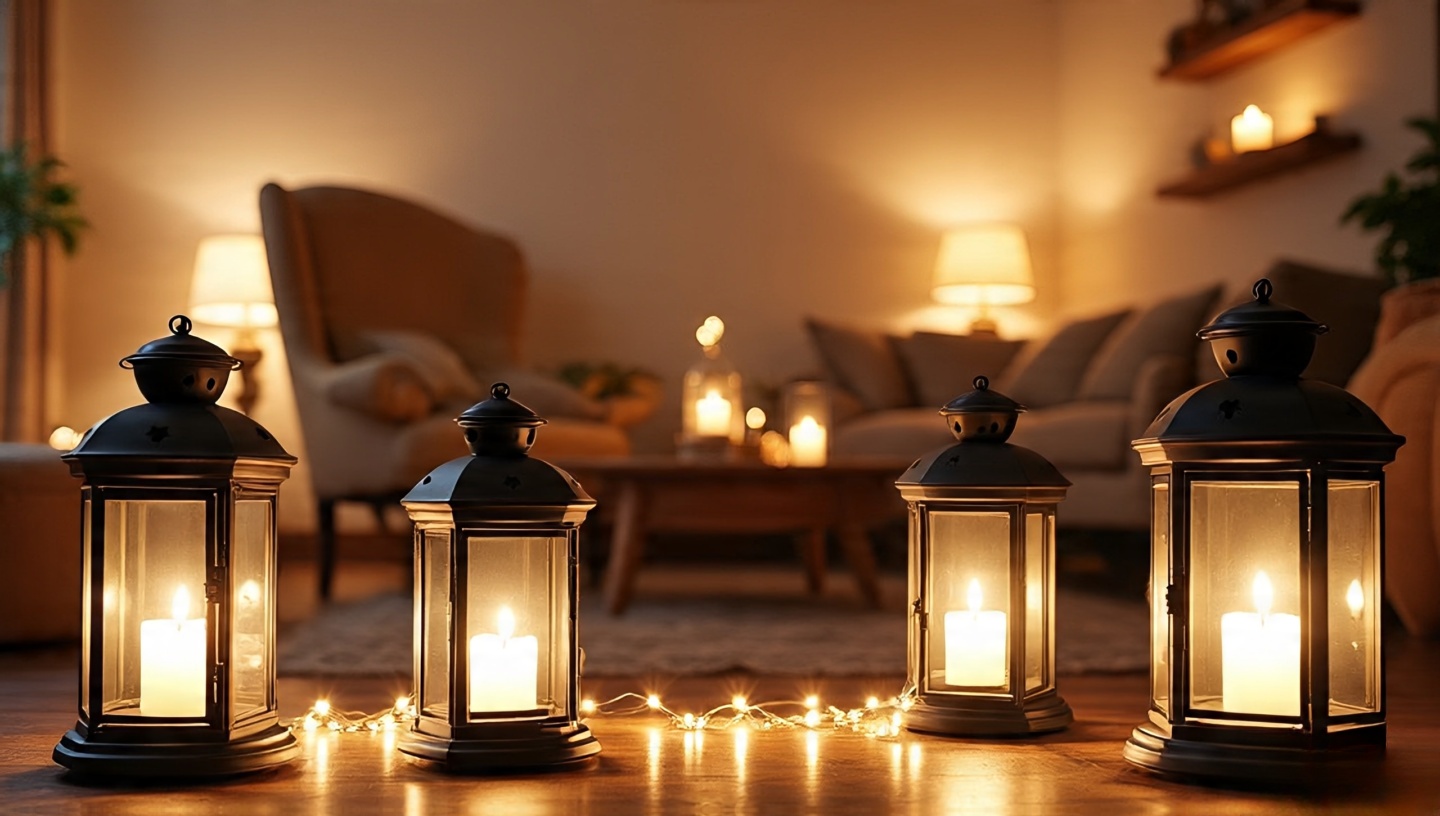
- Safety first: Place candles inside hurricane glass or lanterns; keep 30 cm clearance from fabric and foliage.
- Scent strategy: Pick a family (jasmine/sandalwood/patchouli) and keep it consistent across the room to avoid olfactory clutter.
- Brightness: For ambient feel, aim roughly for 100–200 lux overall; let task lights (reading lamps) punch above that only where needed.
- Mix metals: Antique brass + matte black lanterns create depth without shouting.
Architect’s note: Put string lights and table lanterns on separate dimmers/timers. You’ll use them more when control is effortless.
7) Global-Inspired Textiles: Ethics, Mix, and Maintenance
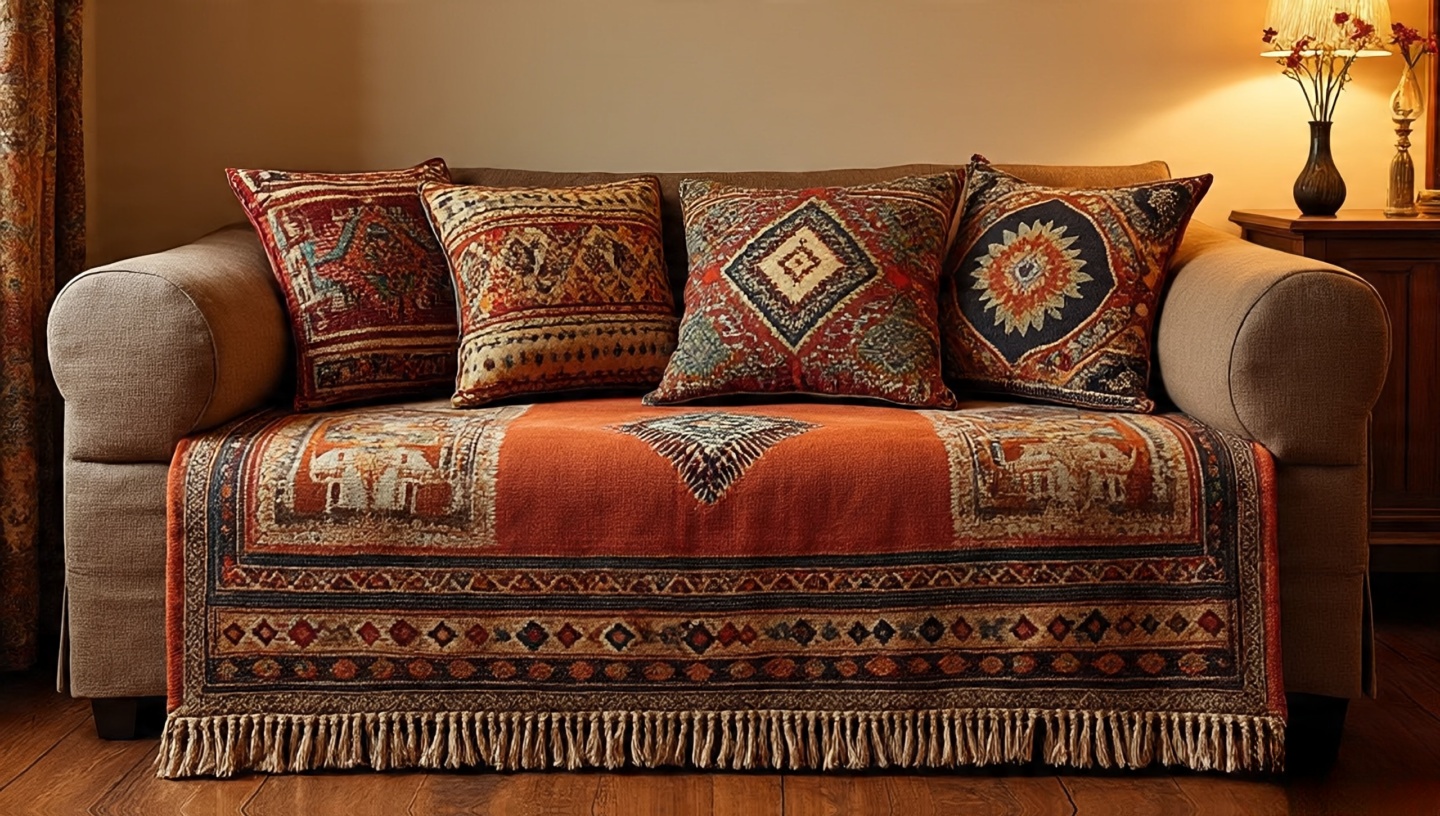
- Provenance: Favor artisan co-ops and fair-trade sources when possible. Your room should honor, not borrow carelessly.
- Palette: Choose one “bridge color” (e.g., rust or indigo) that appears in at least three pieces to unify the mix.
- Care: Many vegetable dyes are sensitive spot test; vacuum with a mesh screen to prevent pulls.
Mini checklist: one bold pattern + one medium pattern + two solids with tactile weaves (bouclé, slub linen) = layered, not loud.
8) Vintage Finds with Soul How to Hunt Like a Pro
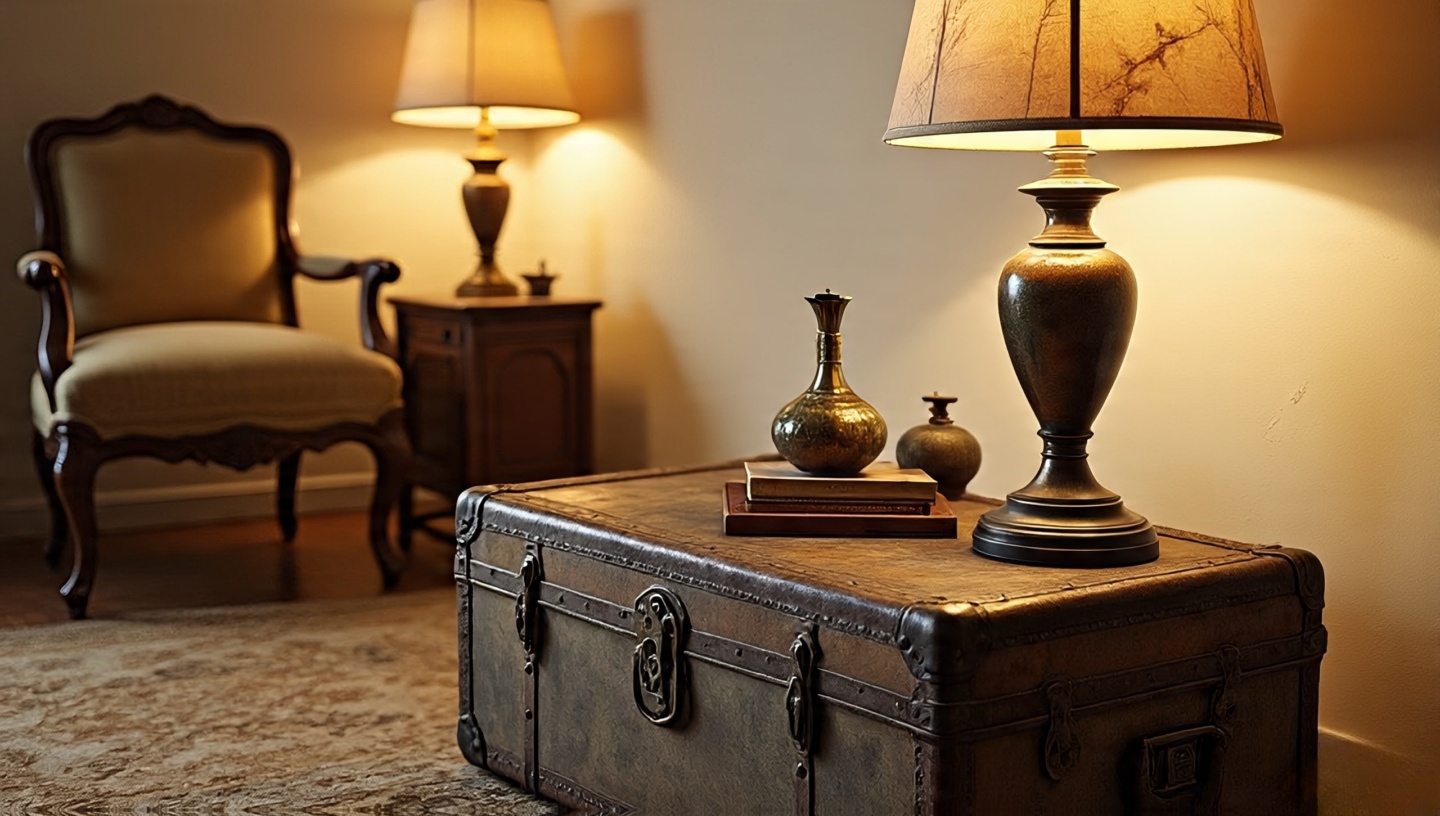
- Structure: Sit, lean, wobble. Joints should creak but not yaw. Look for solid joinery (dovetails, mortise-and-tenon).
- Finish: Distress is character; flaking lead paint is a hazard seal or avoid.
- Smell test: Persistent mildew is hard to kill. If it smells swampy after a sun-bath and vinegar wipe, walk away.
- Quick rehab: A light rub of tung oil or beeswax can revive tired timber in an afternoon.
Architect’s note: Mix eras to dodge the “themed set” trap 1930s lamp, 1970s chair, new clay vessel. Eclectic timeline beats eclectic store aisle.
9) Mixing Patterns Without Fear The Scale Game
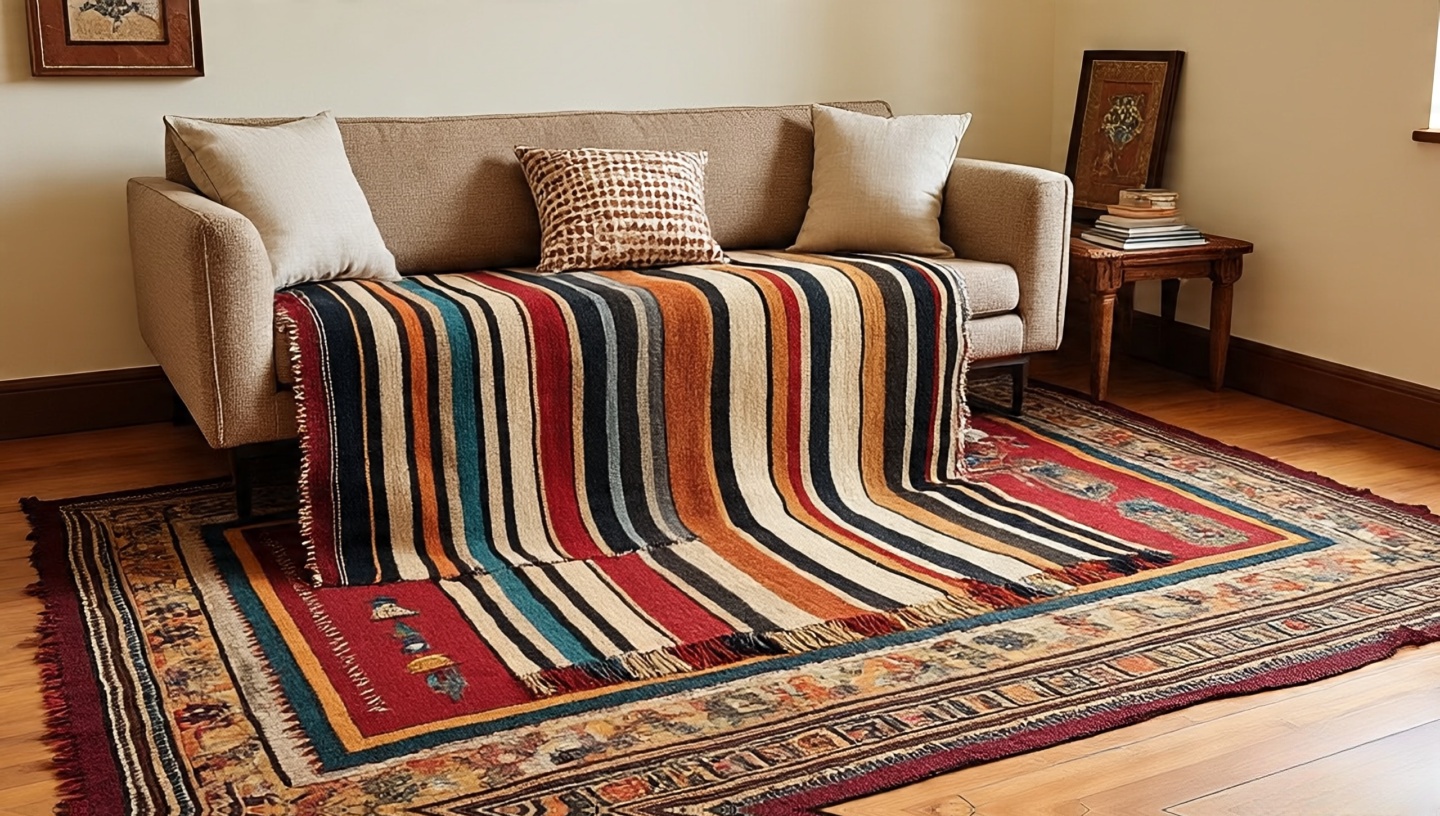
Try this 3-scale recipe:
- Large-scale anchor: e.g., a bold Navajo rug.
- Medium rhythm: a striped throw.
- Small accent: a dotted or tiny-floral cushion.
- Color anchor: Pick 2–3 colors that repeat across patterns (even if saturation varies).
- Proportion guardrail: Use the 60–30–10 rule dominant, secondary, accent.
Common mistake: Five loud patterns, zero quiet textures. Add plains (thick linen, velvet, bouclé) to give the eye somewhere to rest.
10) Warm, Earthy Colors That Feel Like Sunset on Stone
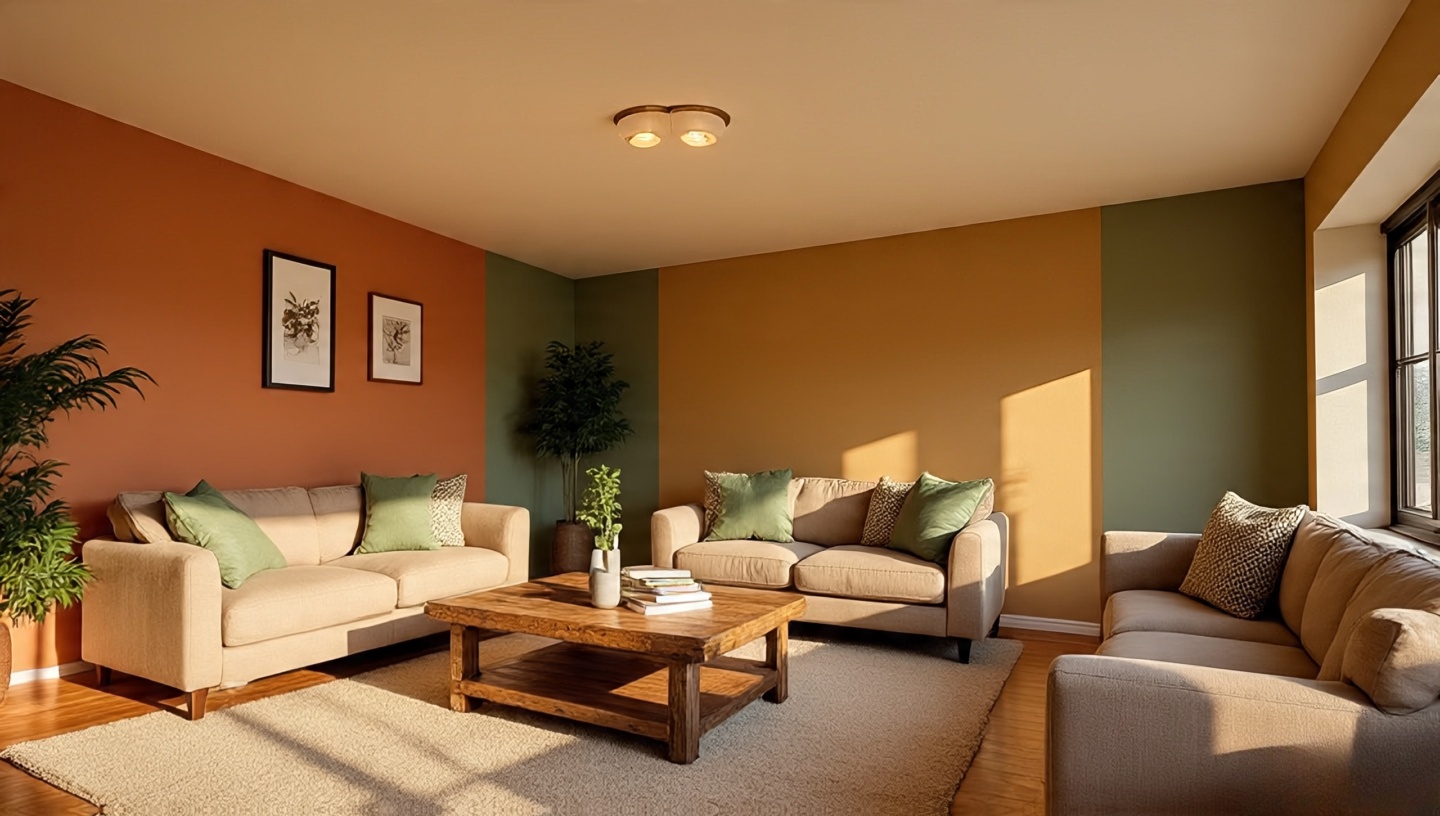
- Wall finish: Matte or eggshell keeps walls earthy; reserve satin for baths/kitchens.
- Two-warm, one-cool: If you run terracotta + ochre, temper with a cool counterpoint (sage, dusty teal) to avoid a muddy feel.
- Light-reflectance: In small rooms, choose paints with mid LRV (≈35–55) so they glow without swallowing light.
- Test large: Paint A4/letter-size samples on two walls; colors shift 30–40% across orientations and daylight.
Architect’s note: Warm palettes love natural timber and off-white ceilings. Pure white often reads blue against earth tones go creamy instead.
11) Sheer Curtains That Float Movement Matters
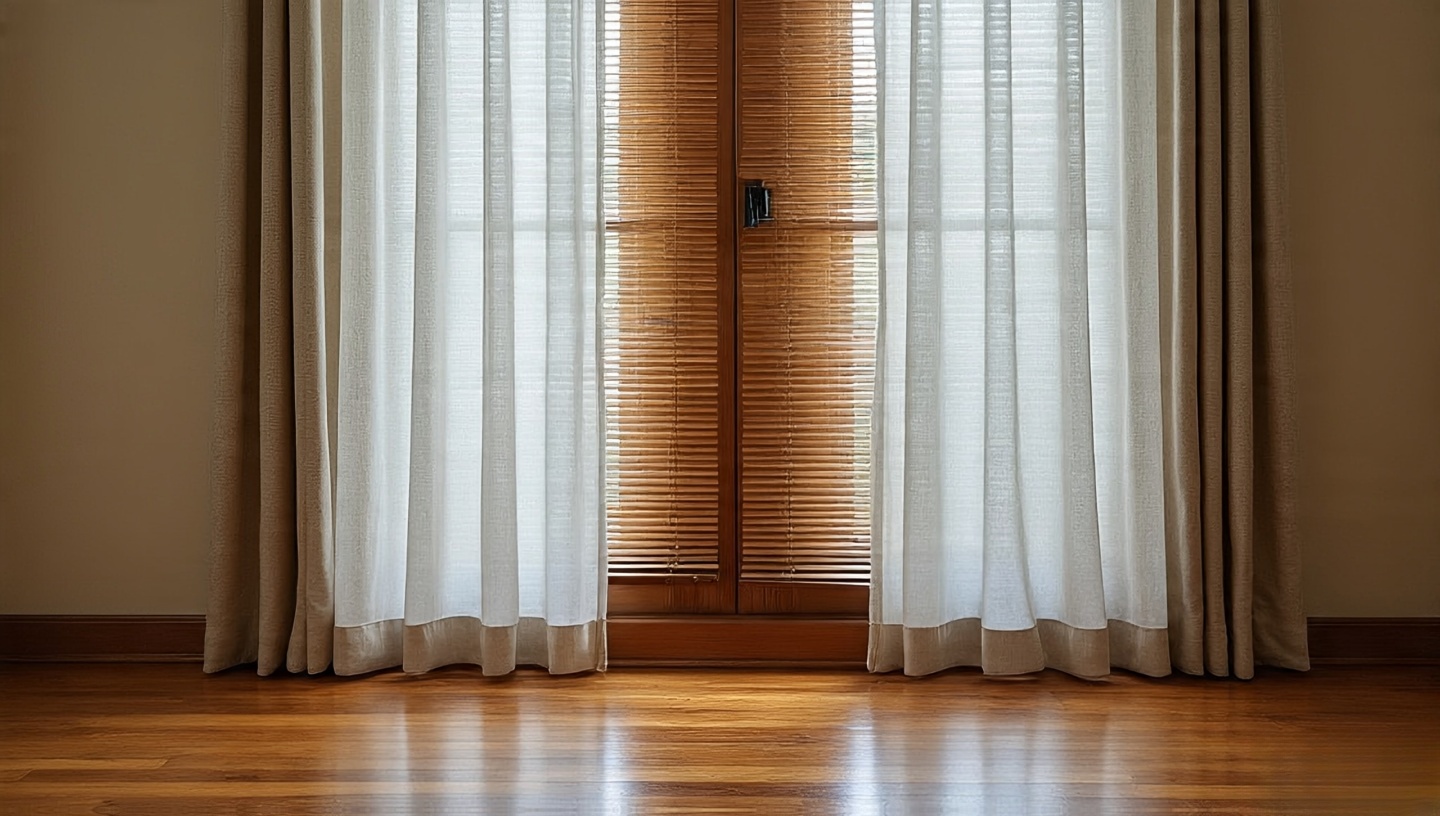
- Mount high: Hang rods at least 15–20 cm above the window frame to elongate the wall.
- Pooling vs. floating: For a relaxed look, let fabric puddle 5–8 cm on the floor. If you have pets or kids, keep them hovering 1–2 cm above the floor.
- Tip: Layer sheer curtains with woven blinds for privacy without losing texture.
12) A Touch of Moroccan Tiles Small Scale, Big Impact
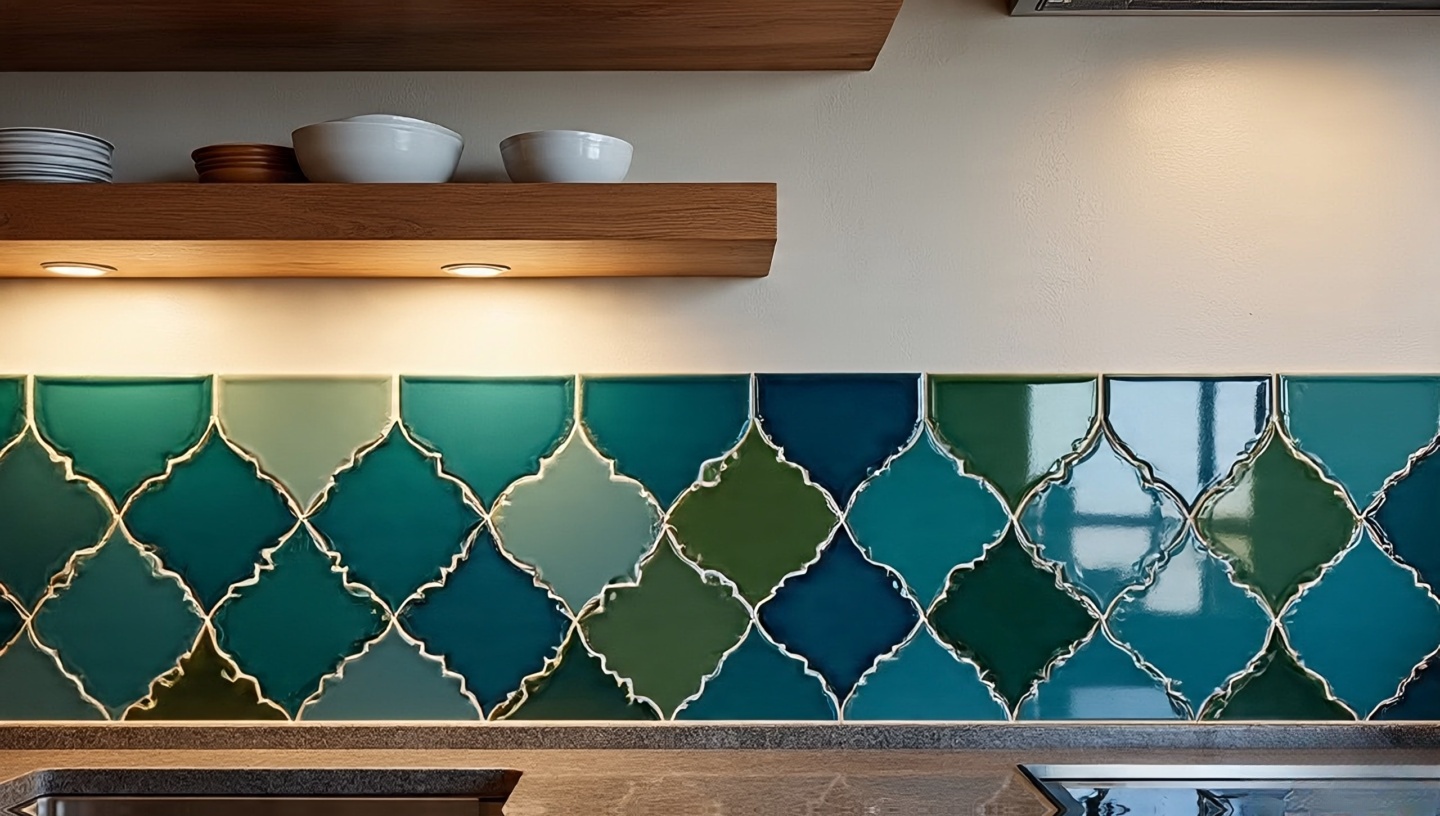
Architect’s advice: Use patterned tiles in a contained zone (backsplash, niche, hearth) and let surrounding finishes be simple so the tiles read as intentional highlights.
13) Handmade Pottery The Weight of Real Craft
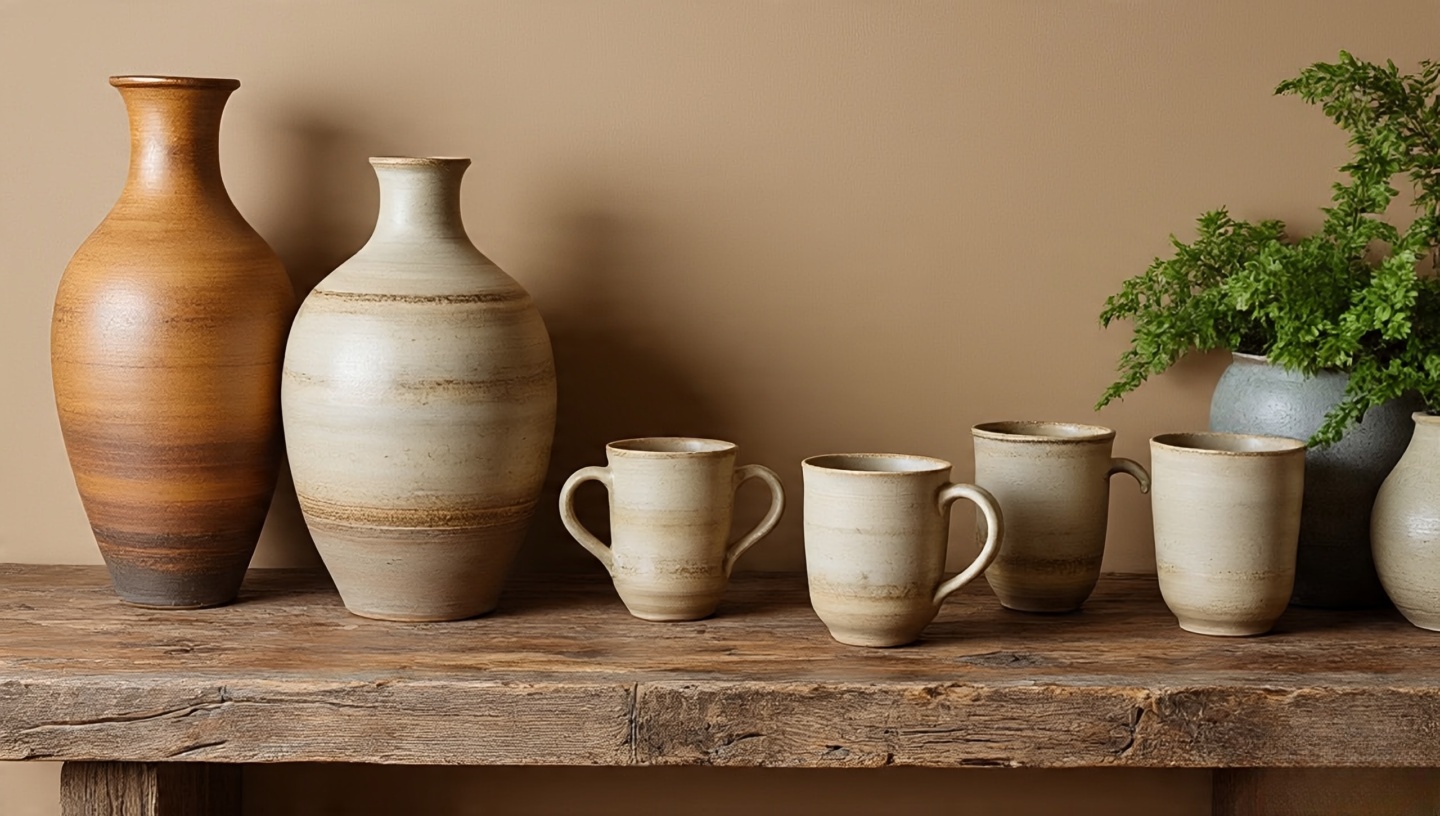
- Pairing: Use pottery against smooth surfaces like polished stone counters so the texture stands out.
- Care: Avoid dishwashers for unglazed pottery; handwash to preserve patina.
14) Gallery Walls That Evolve, Not Arrive Finished
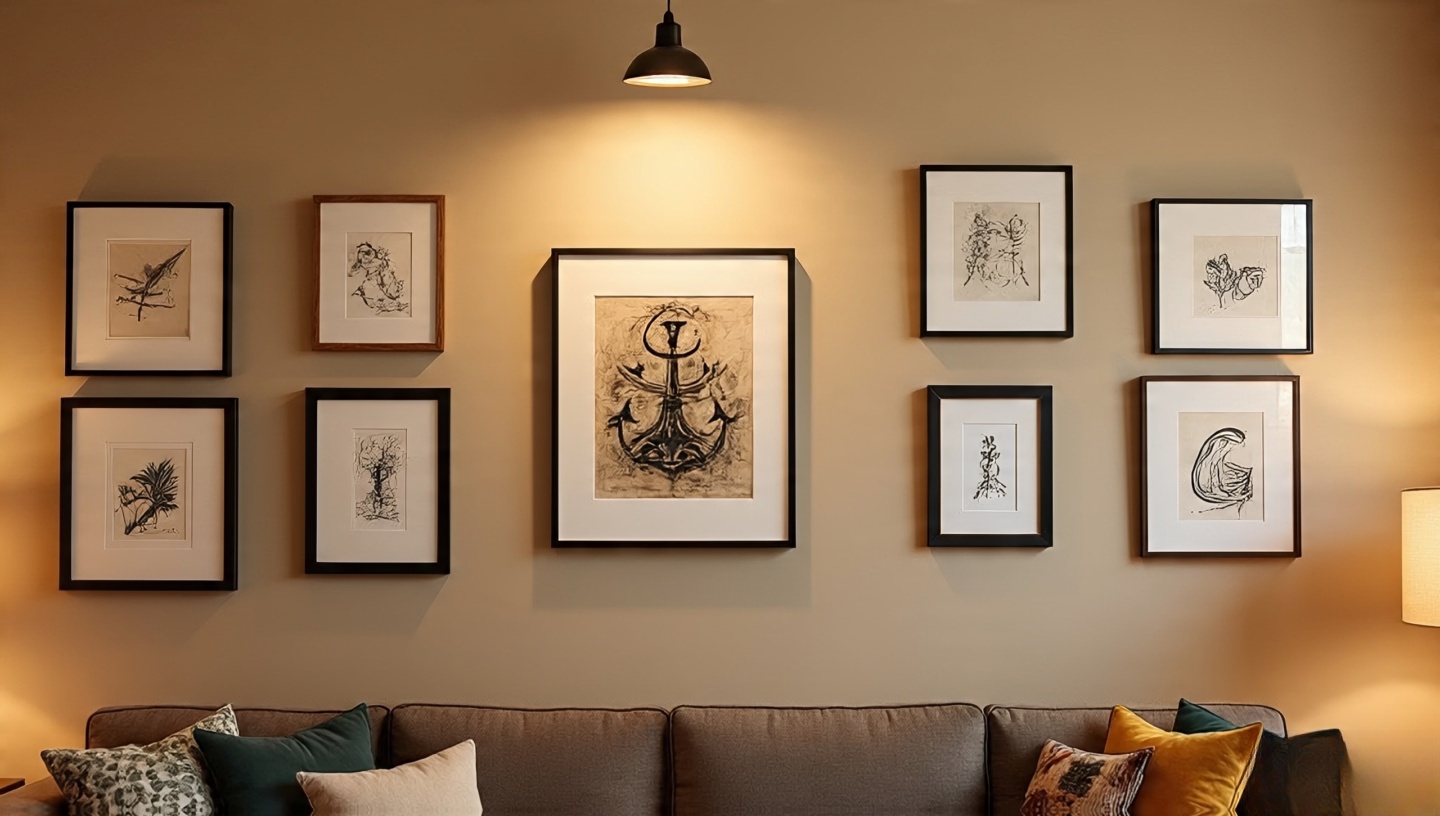
Pro tip: Start with one anchor piece at eye level, then add organically. Mix frames, but keep spacing consistent (≈5–7 cm apart) to avoid chaos.
15) Cozy Reading Nooks Corners with Purpose
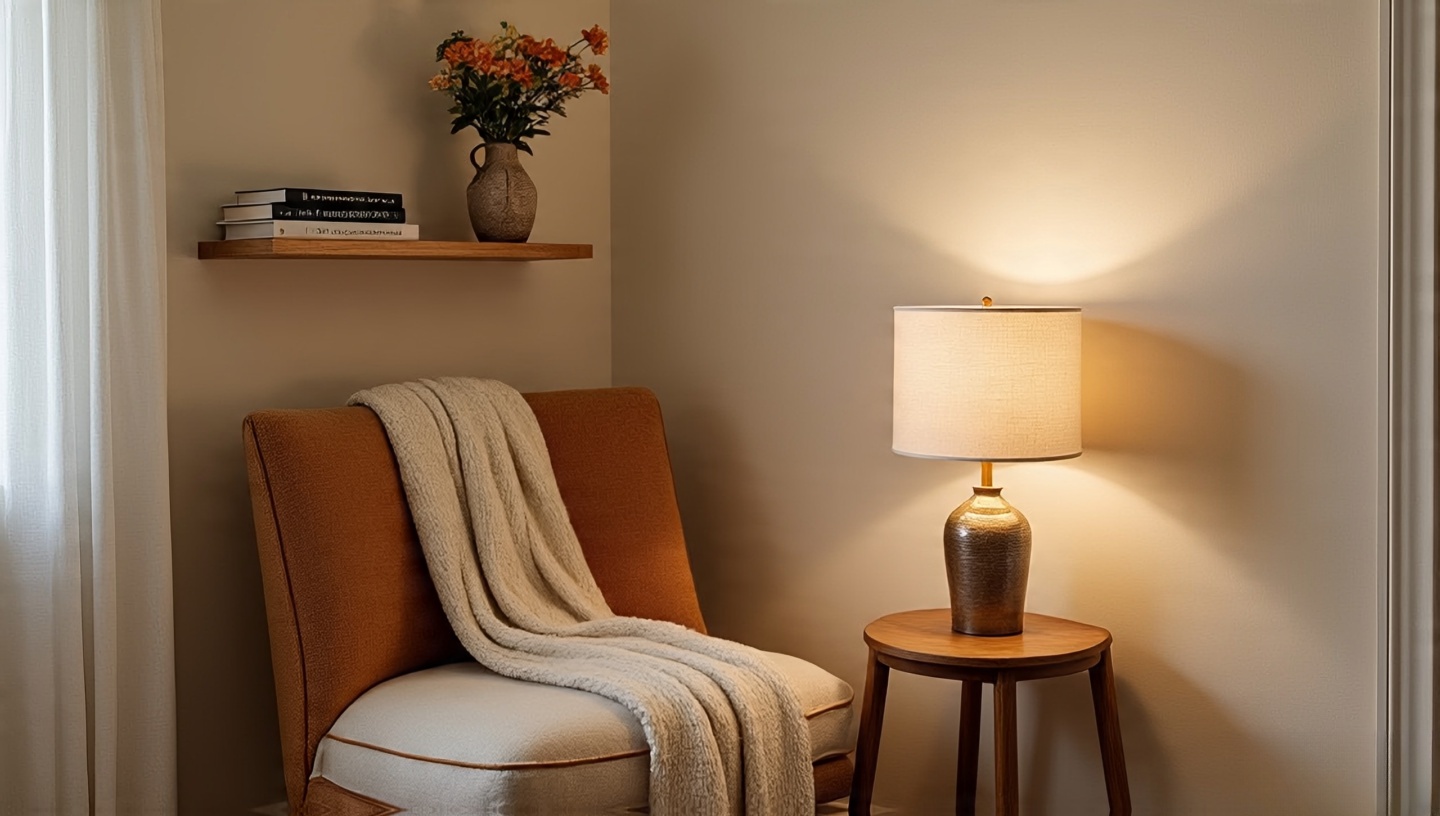
- Light level: For reading, aim for 300–500 lux at seat level. Use a warm bulb (2700K) to keep it cozy.
- Chair depth: 55–60 cm is ideal for curling up without slouching.
- Architect’s note: Add a small shelf within arm’s reach function turns a corner into a ritual.
16) Fairy Lights Never Get Old But Place Them Smart
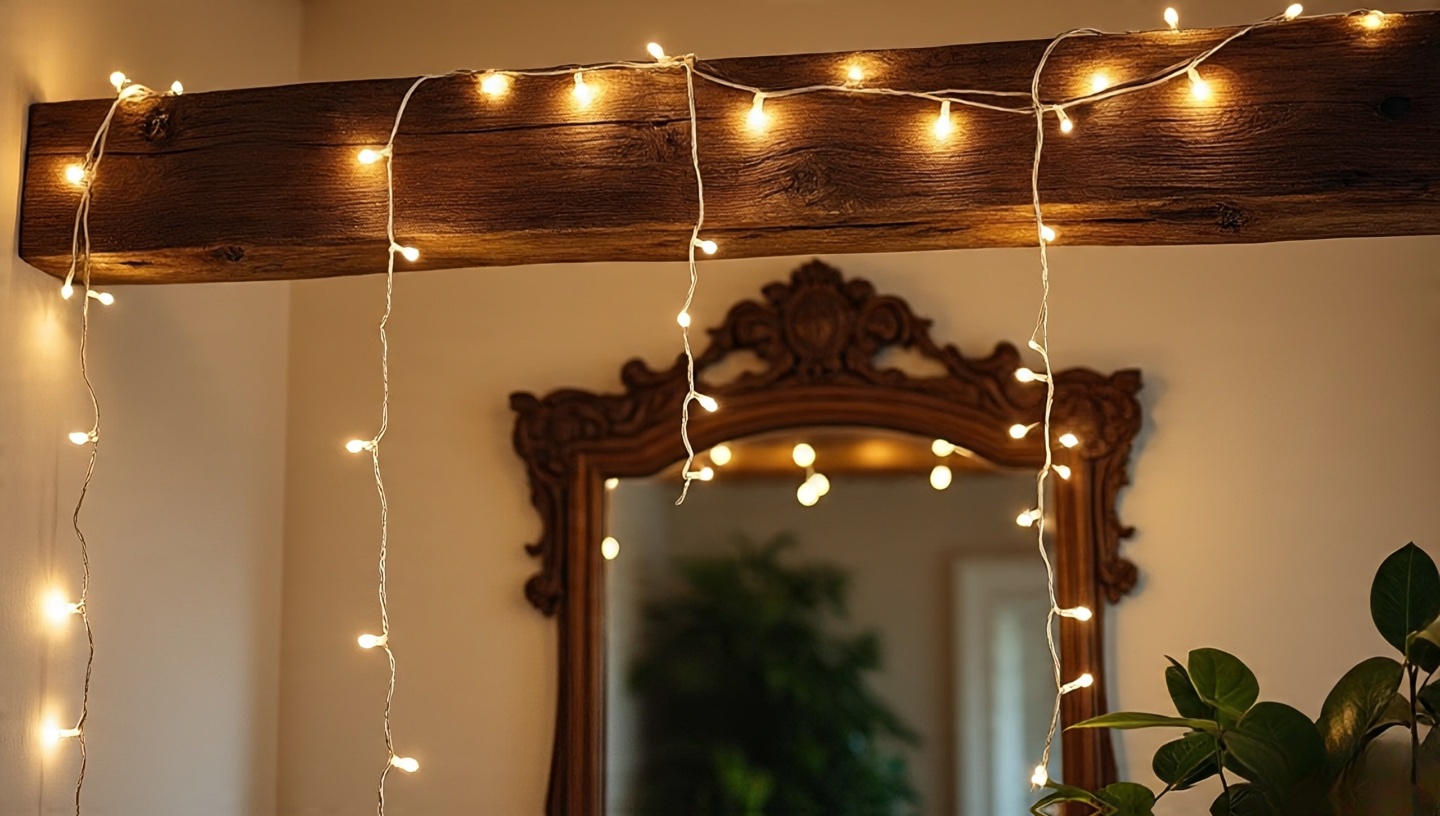
- Wrap beams or drape loosely around a mirror instead of zig-zagging walls.
- Warm-white bulbs (2200–2700K) feel magical; cool-white reads dorm-room.
- Hide cords behind fabric or plants so only the glow remains.
17) Low Coffee Tables Scale for Conversation
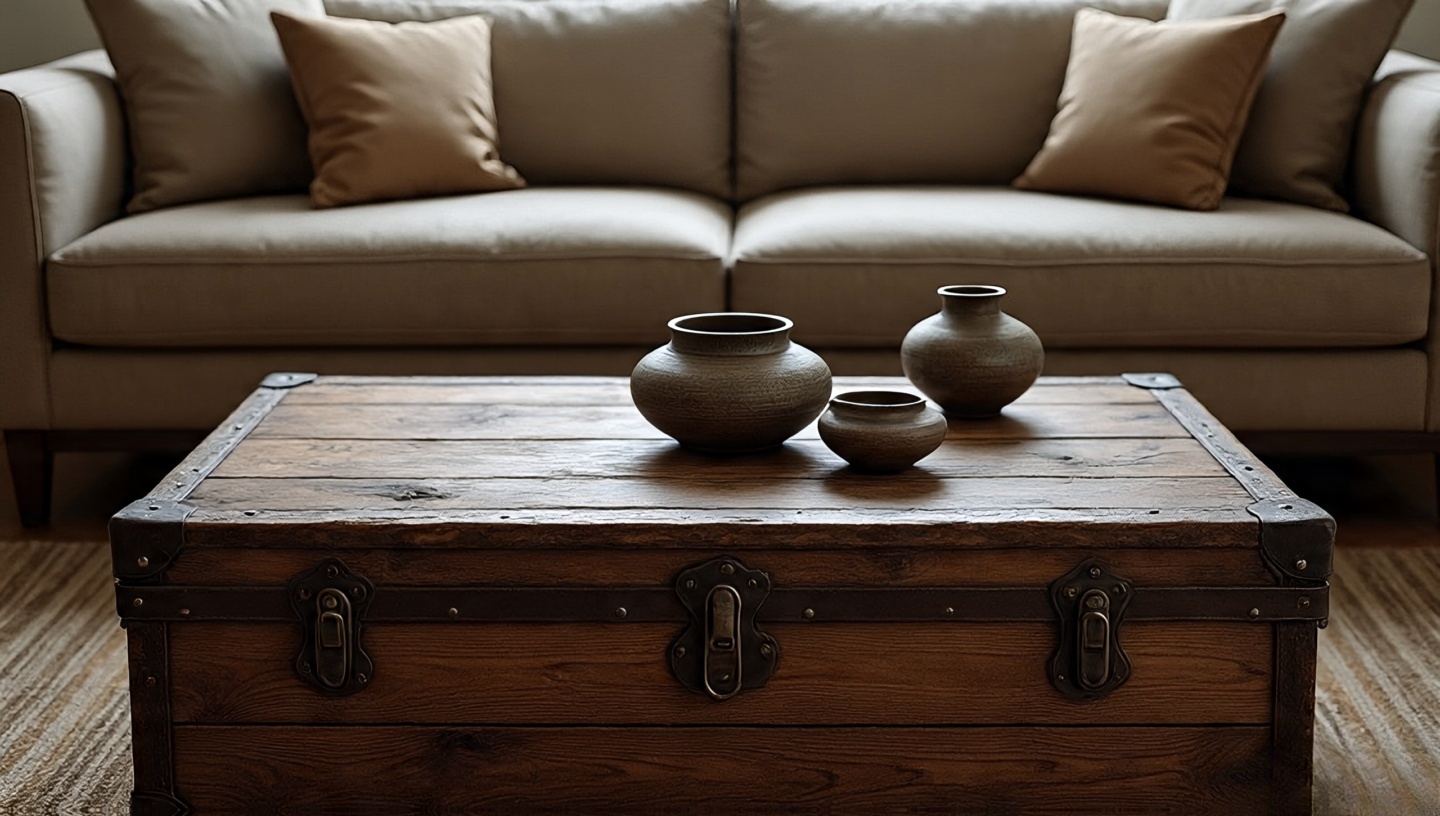
Dimension rule: Table height ≈ 5–8 cm lower than seat height. Width ≈ two-thirds of your sofa length for balance.
18) Fire Pit Indoors? Almost
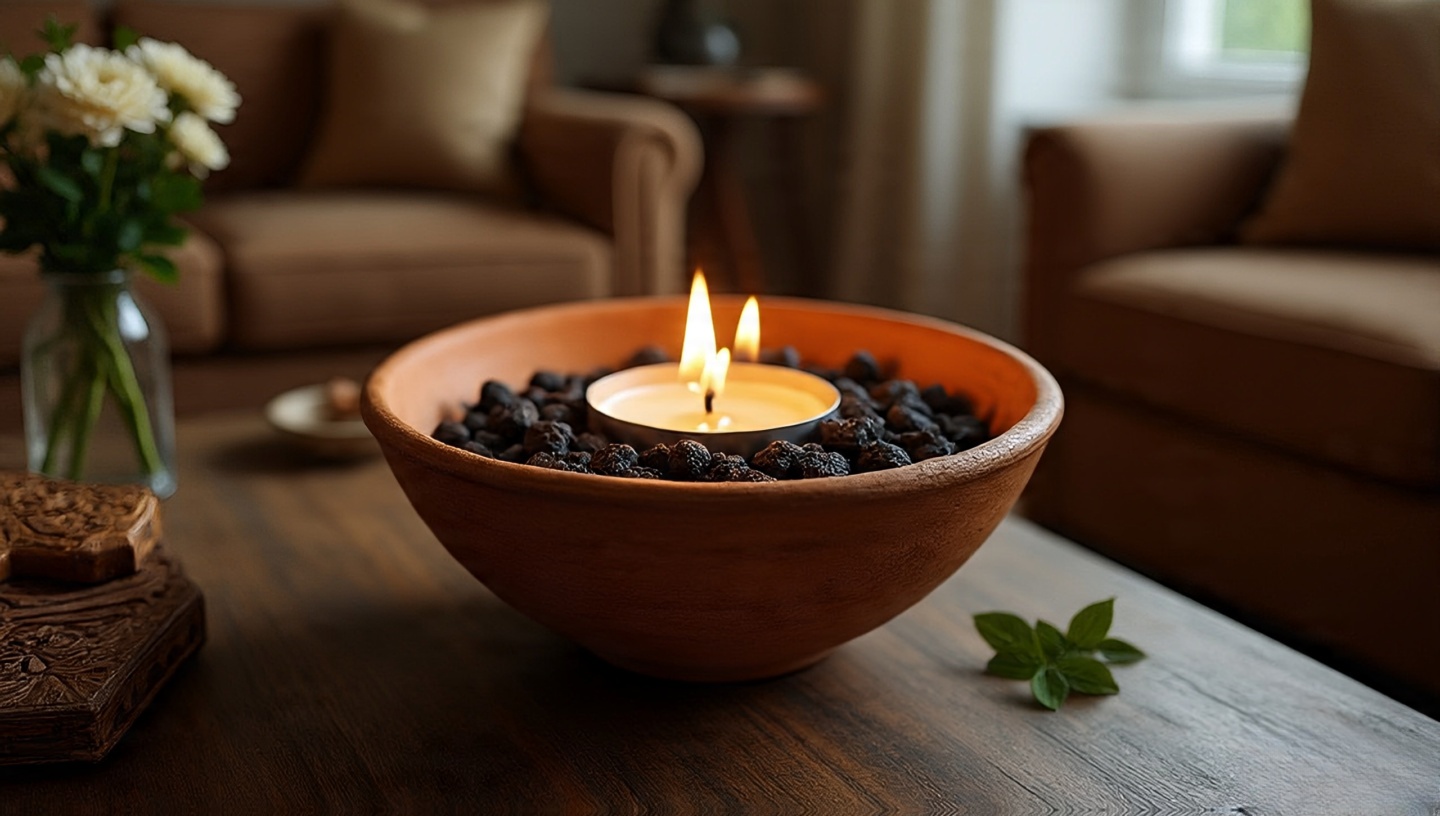
Safety reminder: Keep open flames at least 60 cm away from fabrics and use a fireproof base. Imperfection is Boho, but safety isn’t optional.
19) Beads and Tassels Small Details, Big Personality
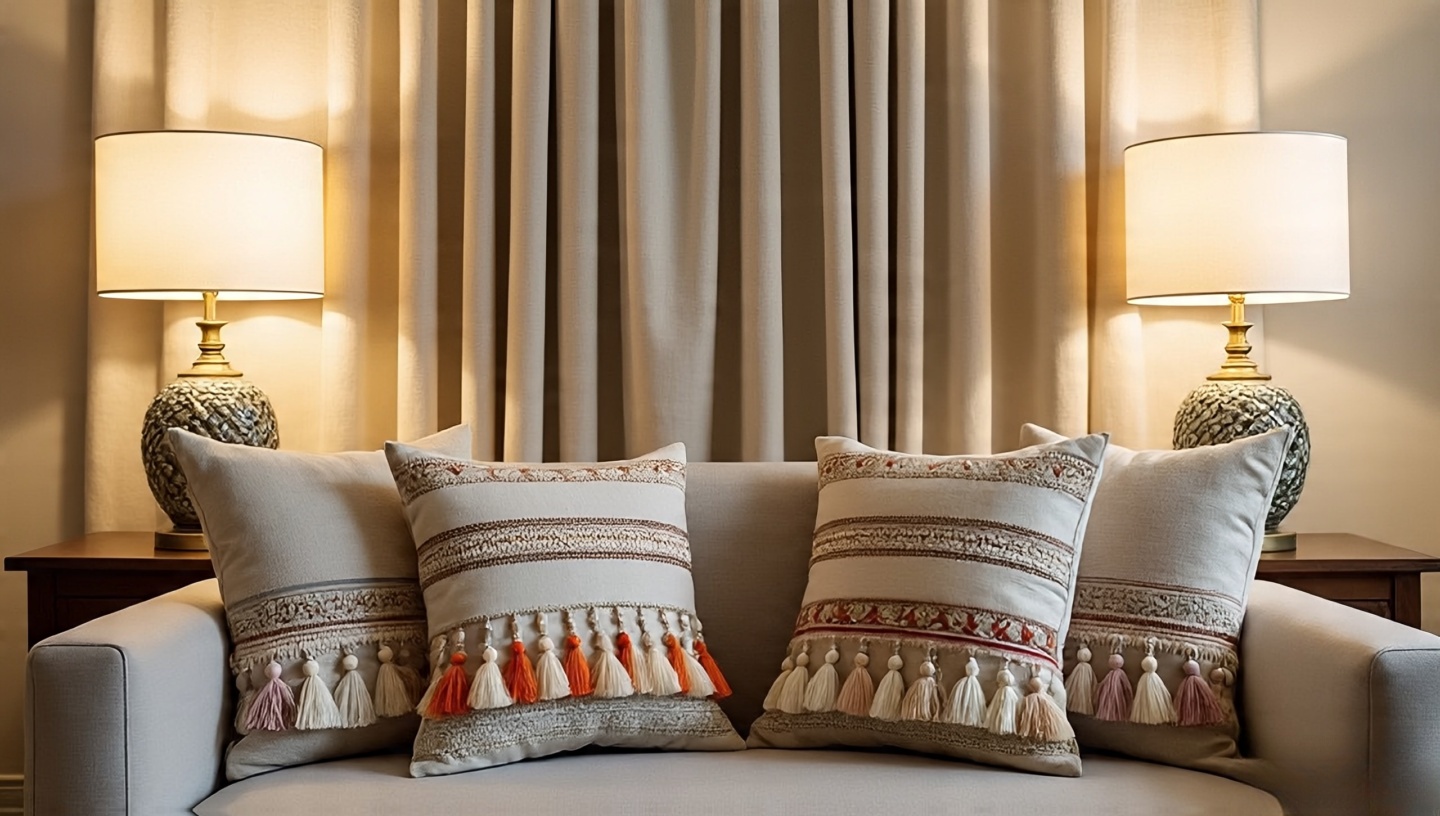
- Design tip: Limit to two or three accents per room. Too many tassels tip into costume.
- Material choice: Cotton tassels soften the mood; leather tassels edge it up.
20) Imperfect Floors Celebrate the Scars
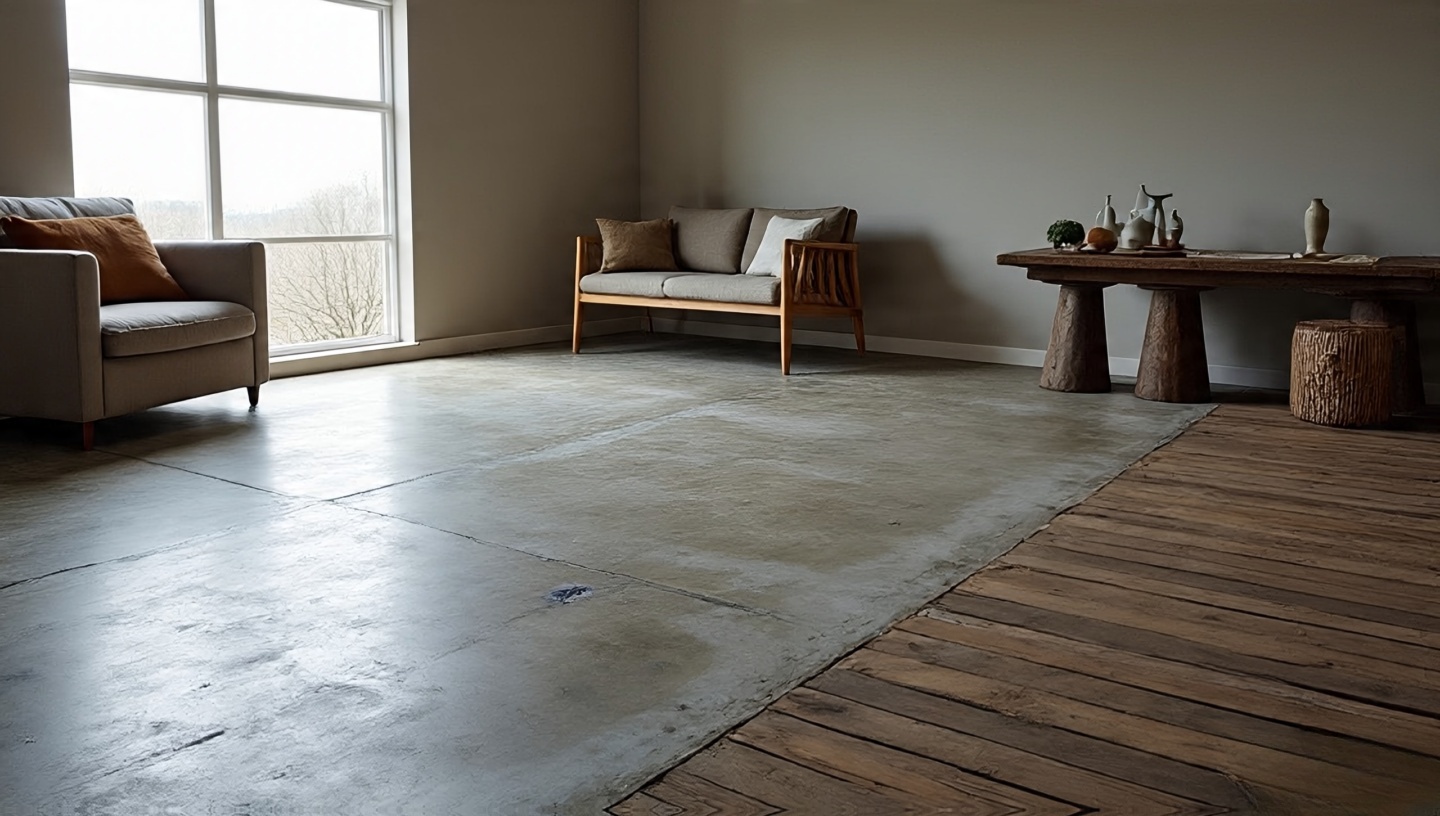
Architect’s perspective: If refinishing wood, consider a matte sealant. Gloss exaggerates flaws; matte makes them part of the character.
21) Boho Open Floor Living Rooms Let It Breathe
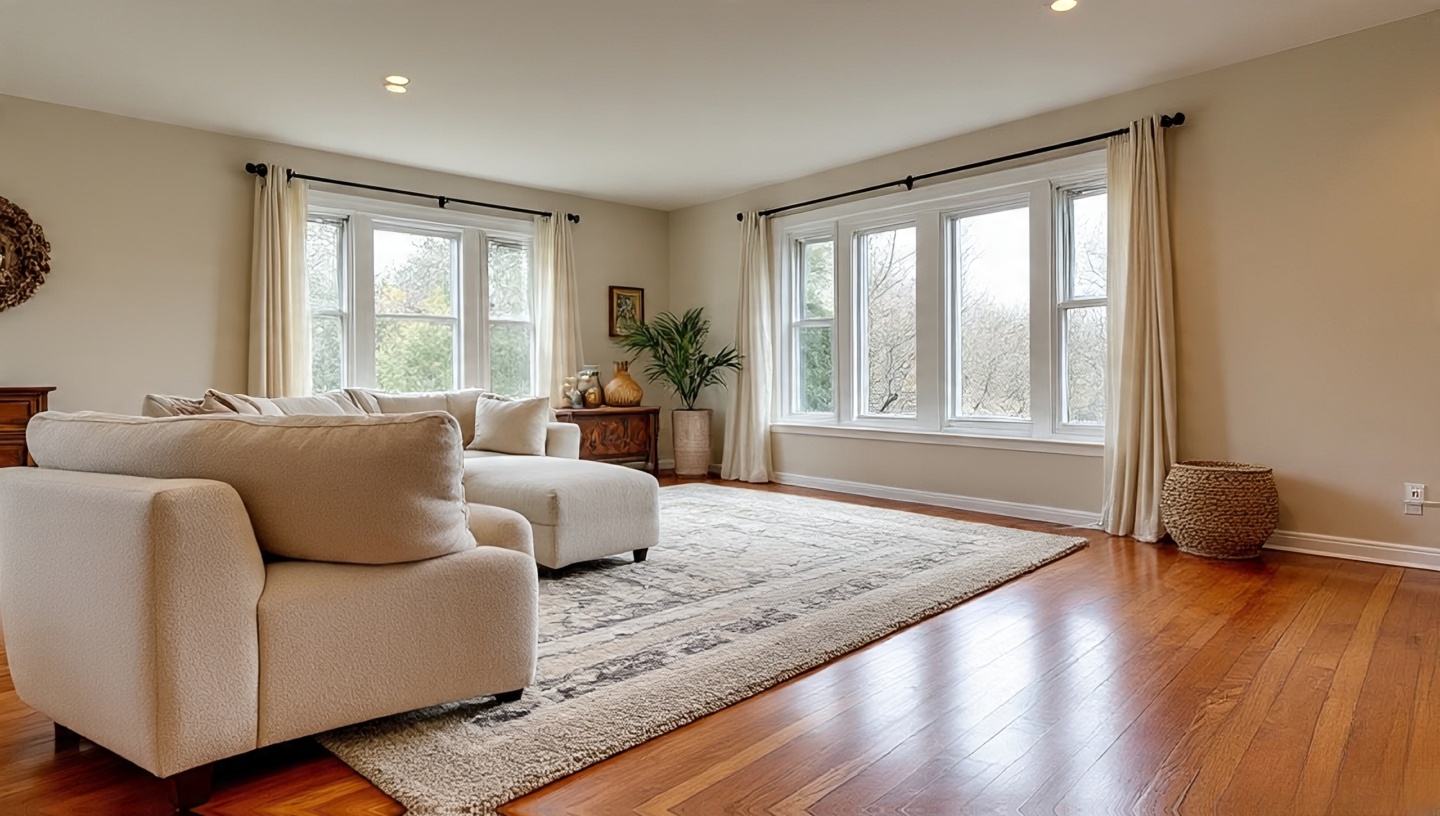
- Scale check: Rugs should define zones; if two rugs touch, let them overlap at least 20 cm so zones read connected.
- Furniture islands: A low bench or console table doubles as divider without blocking light.
Architect’s tip: Keep sight lines clear to windows. Boho thrives on natural light spilling through multiple corners.
22) Floor Cushions for Laid-Back Living
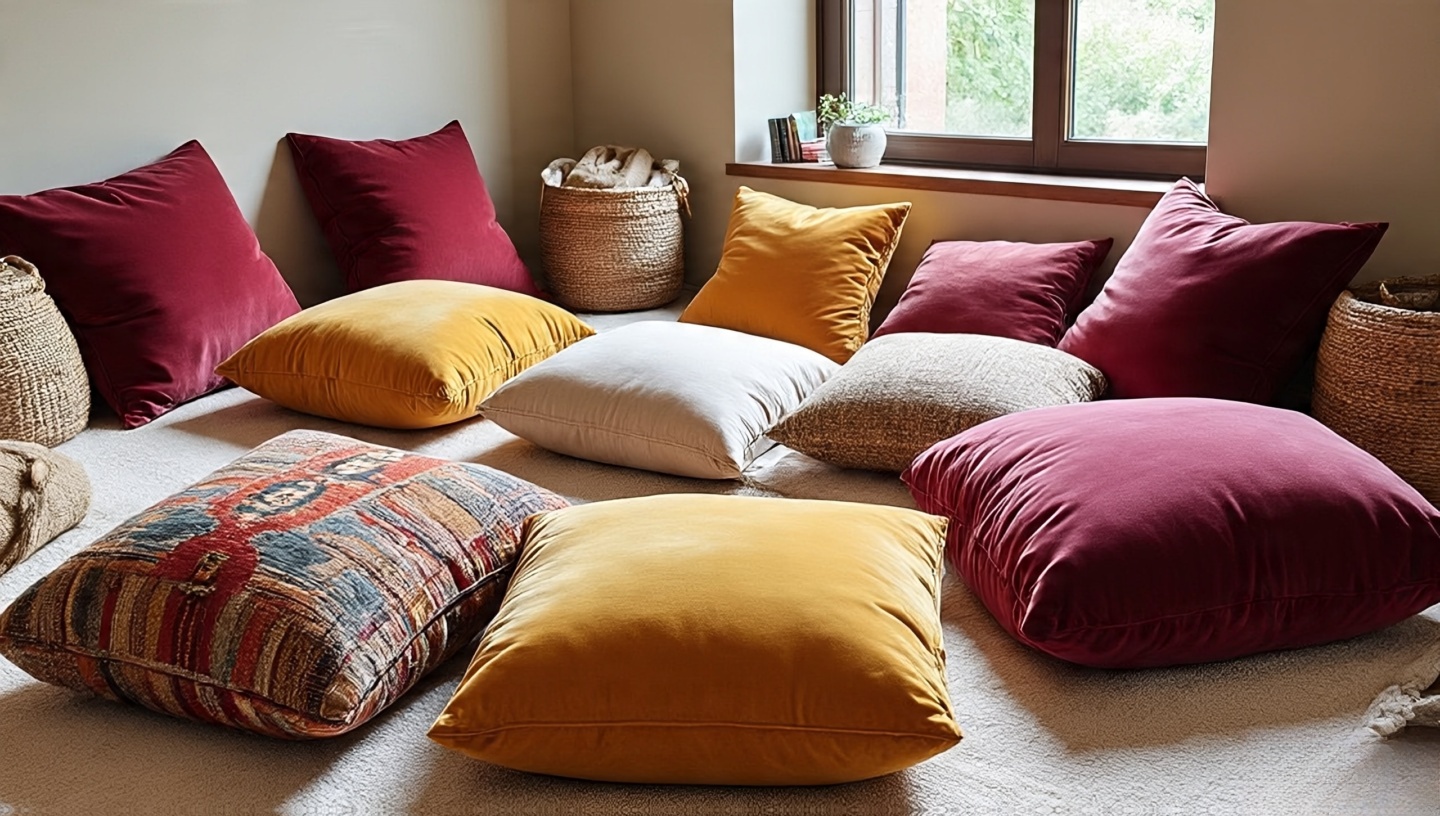
- Mix textures: velvet for softness, kilim for grit, linen for breathability.
- Cluster in odd numbers 3, 5, or 7 cushions feels organic.
Pro note: Store extras in woven baskets so they don’t feel like clutter when not in use.
23) Tapestries with a Story
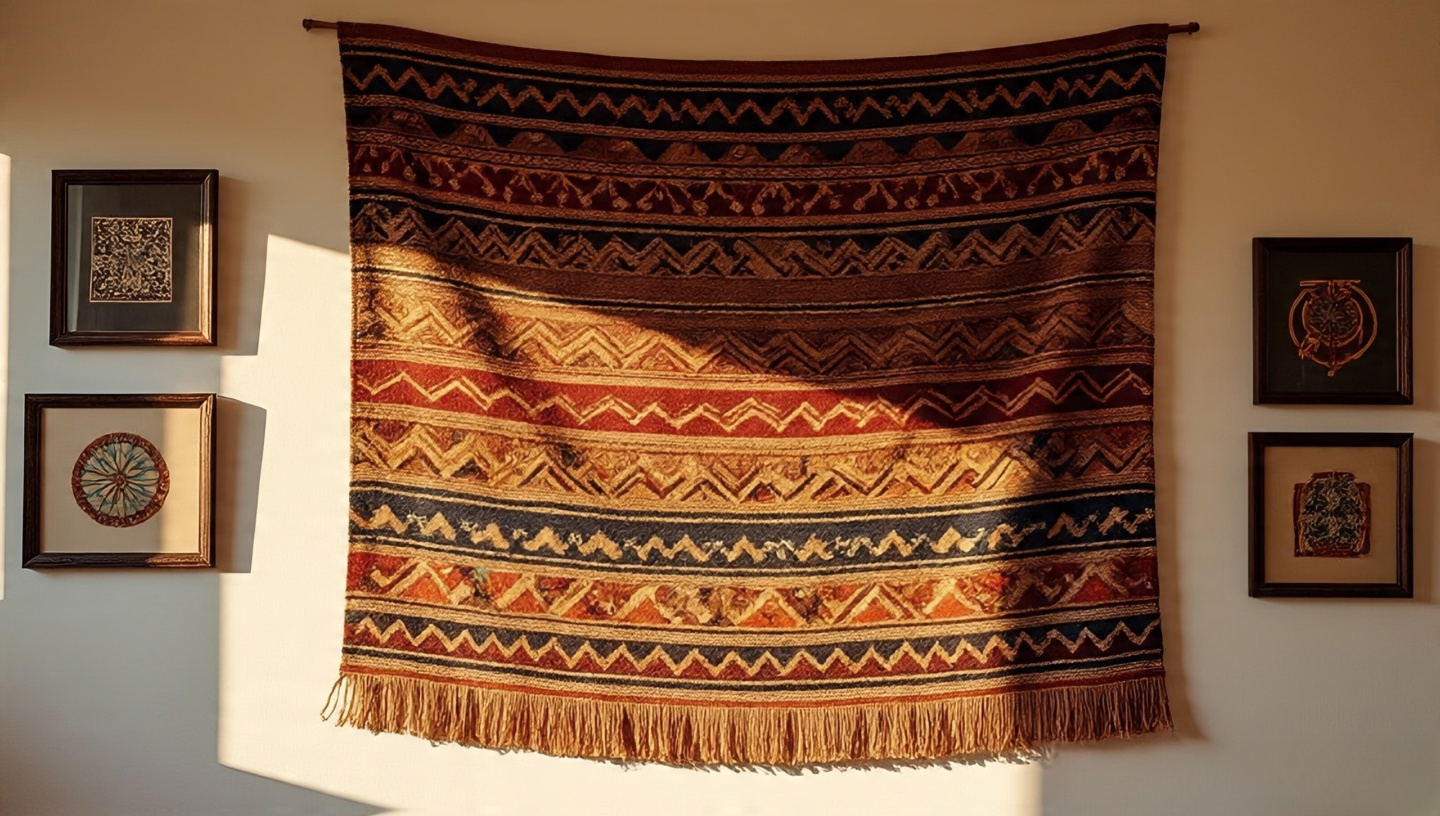
- Placement: Hang one large piece at eye level as an anchor. Layer framed art around it if you want complexity.
- Texture: Pick something tactile, not shiny. You want it to catch light and shadow.
24) Reclaimed Wood Furniture History Under Your Elbows
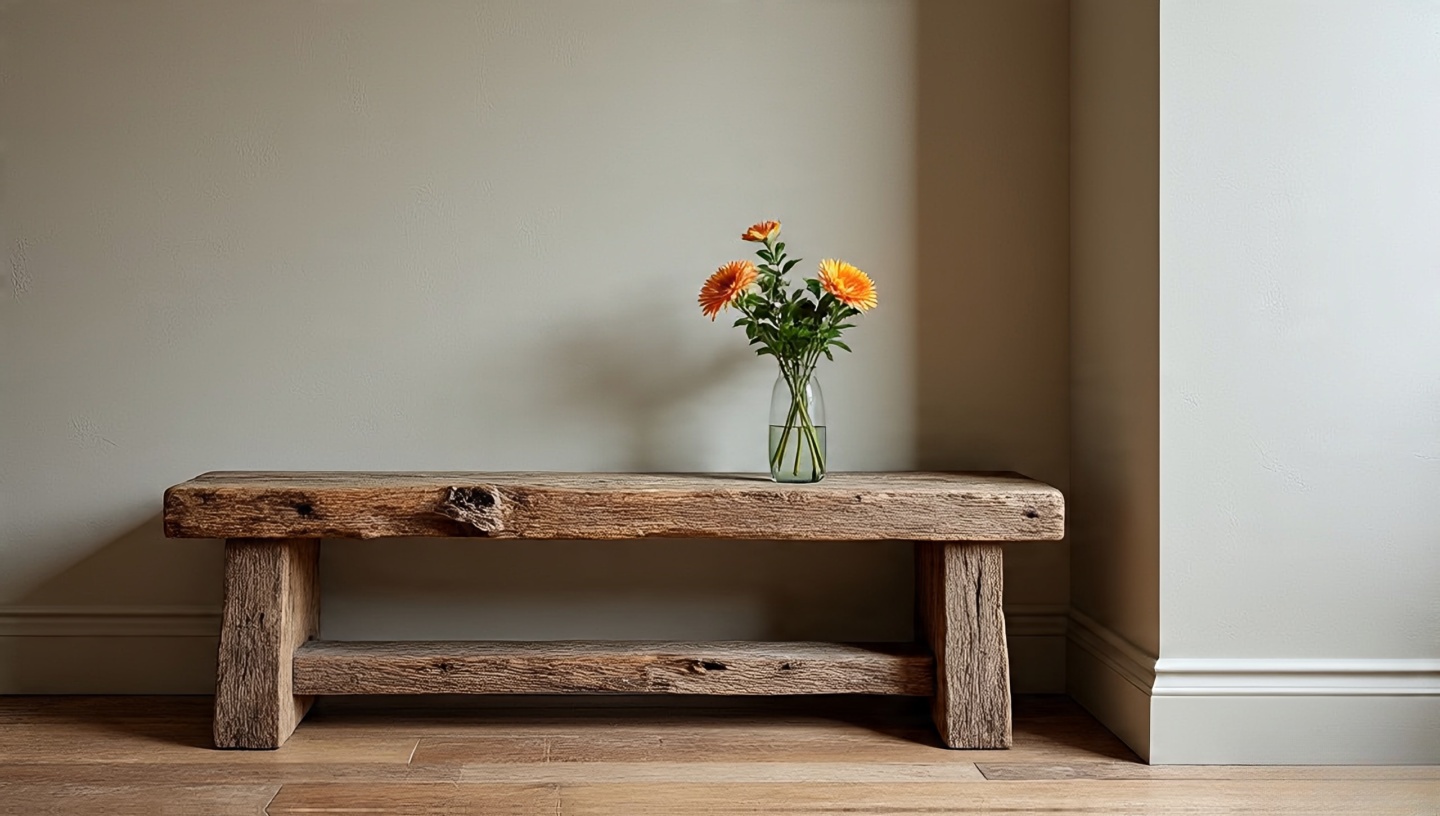
- Finish: A matte oil protects without erasing patina.
- Balance: Pair rustic wood with smooth plaster or glass to avoid the “cabin overload.”
Architect’s insight: Look for stability warped boards can throw off function. Reinforce with steel brackets if needed.
25) Cozy Firelight Glow Without a Fireplace
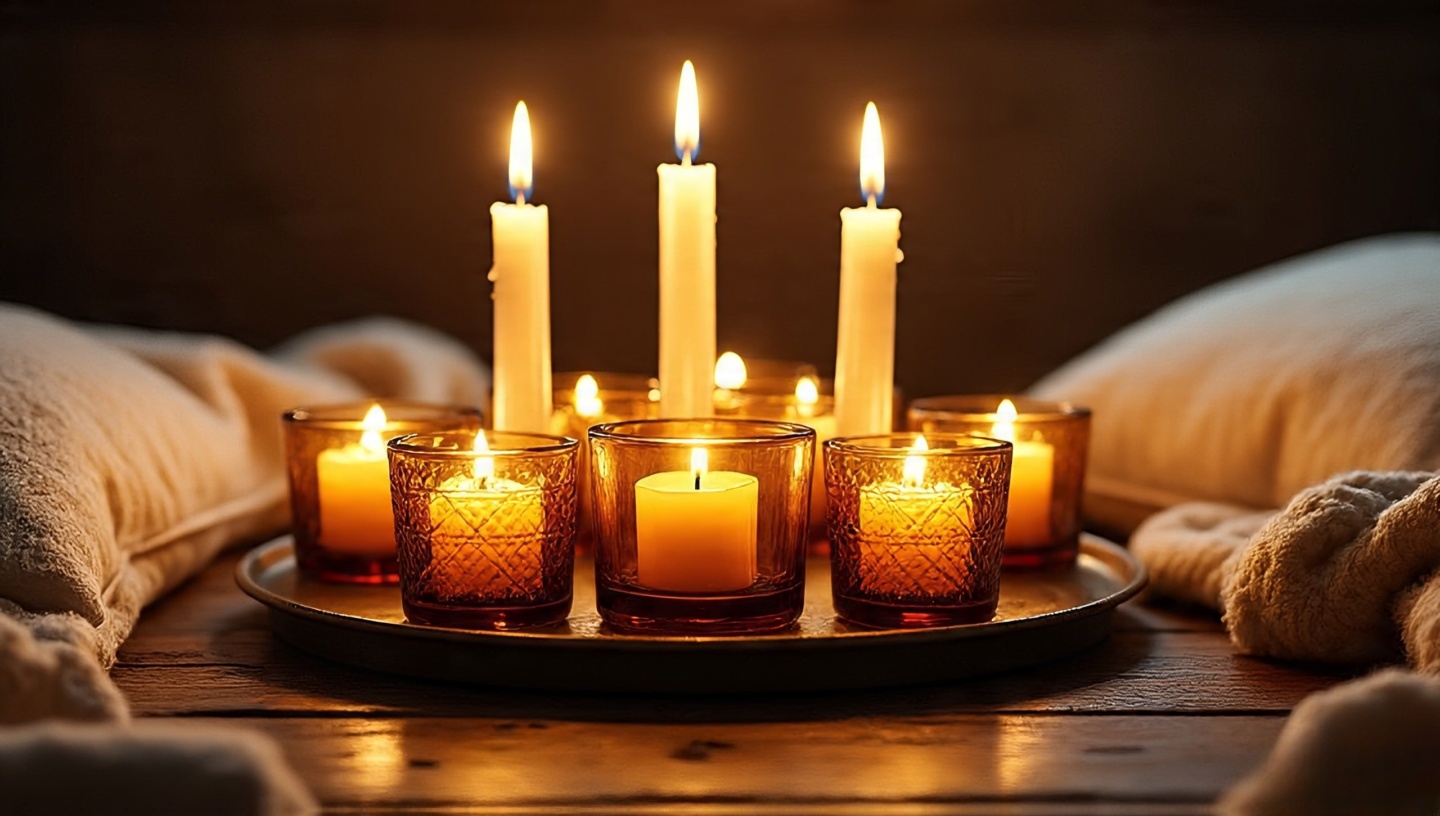
- Cluster candles of different heights on a fireproof tray.
- Add amber glass holders to soften the flame.
The aim isn’t brightness. It’s the after-dinner linger light the kind that keeps conversations alive.
26) Mismatched Dining Chairs Imperfection as Design
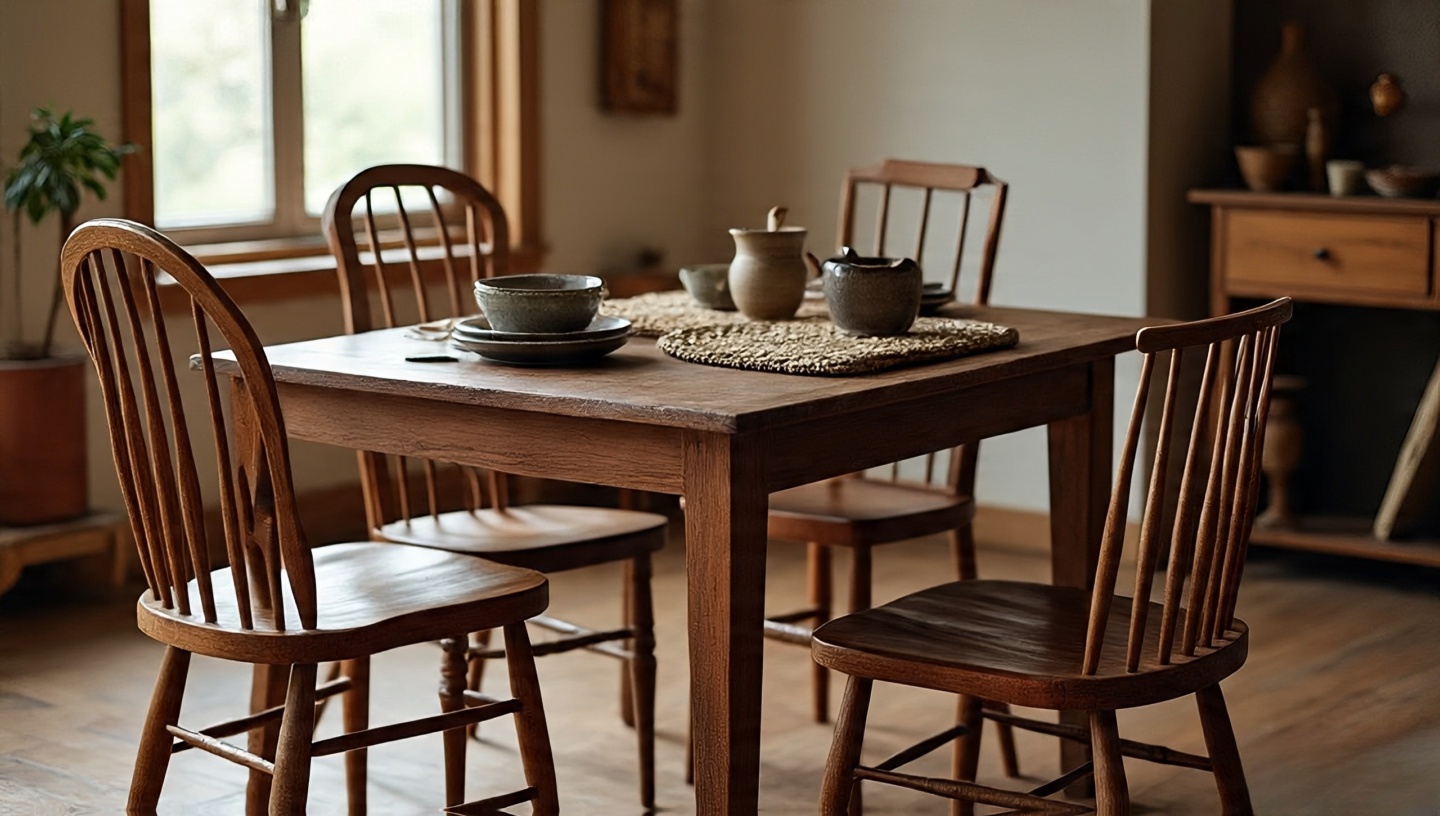
- Consistency choice: match finish (all wood), height (±2 cm), or color family.
- Mix styles: pair a spindle-back with a mid-century chair it works if heights align.
27) Woven Baskets Everywhere
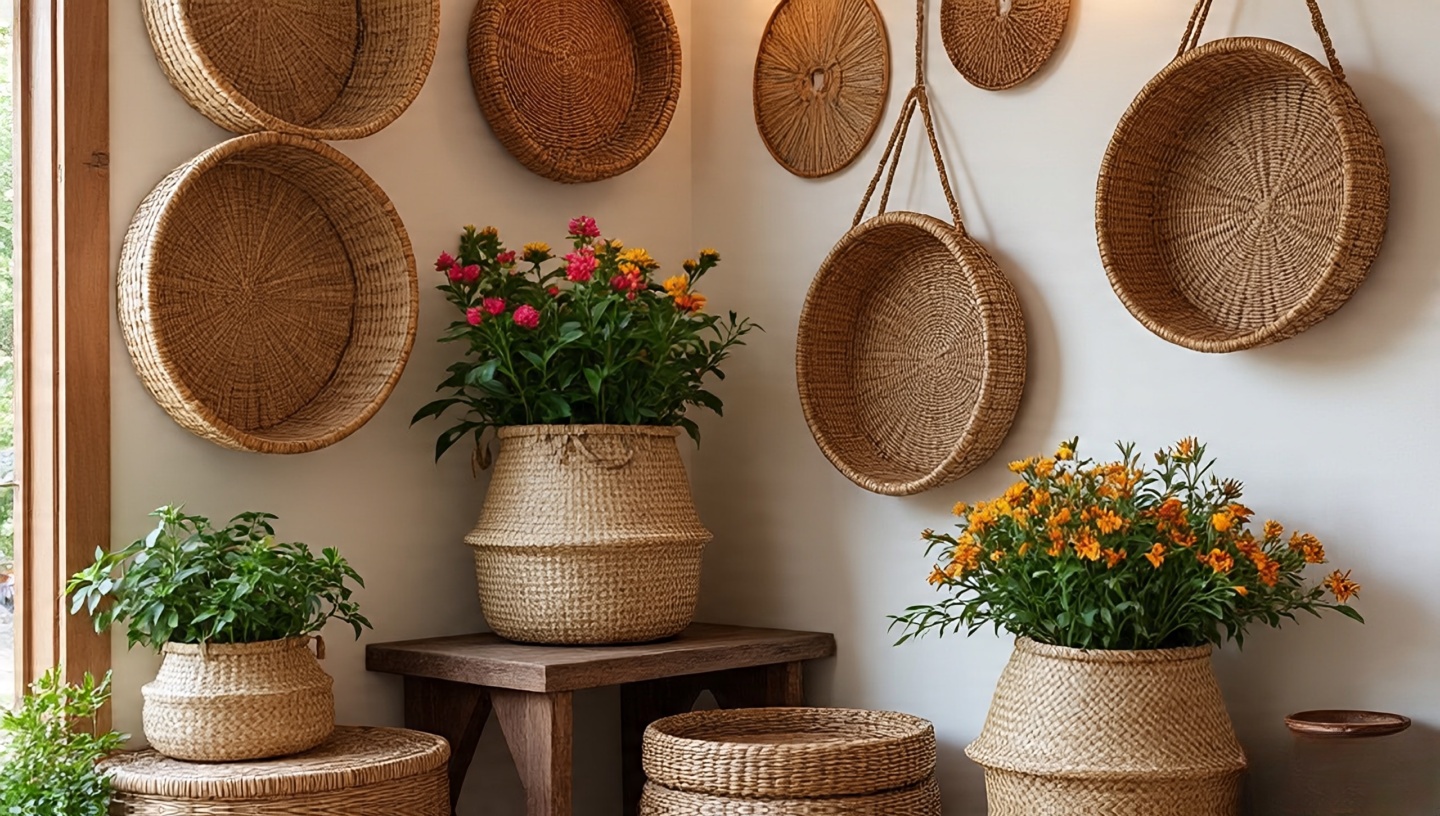
- Shape tip: Mix round and oval for variety. Avoid more than three identical ones in a row.
- Architect’s note: Keep woven baskets slightly off damp floors to prevent mold use small pads underneath.
28) Layered Lighting Build Atmosphere in Tiers
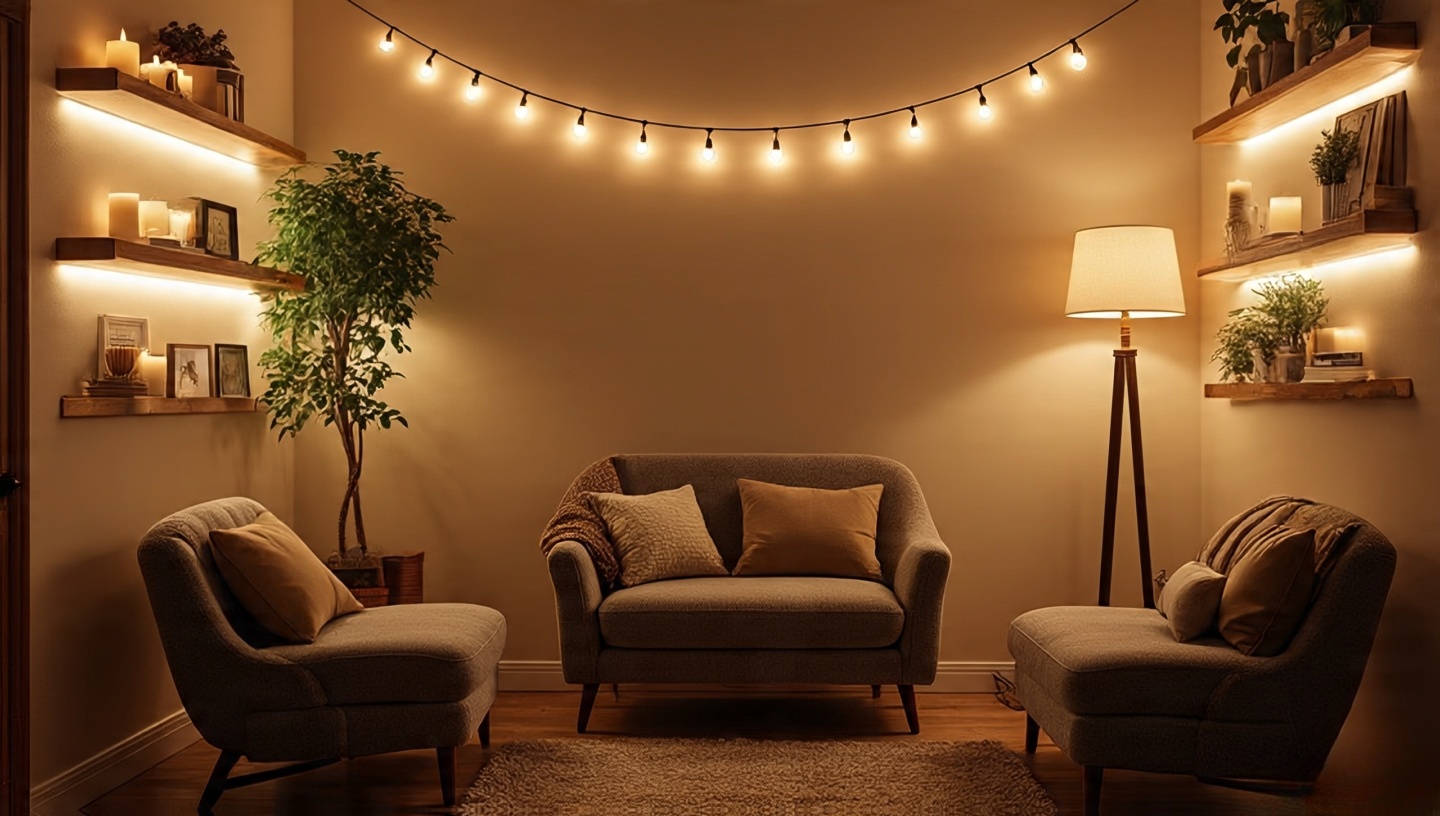
- Ambient: ceiling fixtures or string lights.
- Task: floor lamps by reading chairs.
- Accent: candles, sconces, or lanterns.
Rule of thumb: Every seat should have light within arm’s reach.
29) Driftwood and Natural Accents
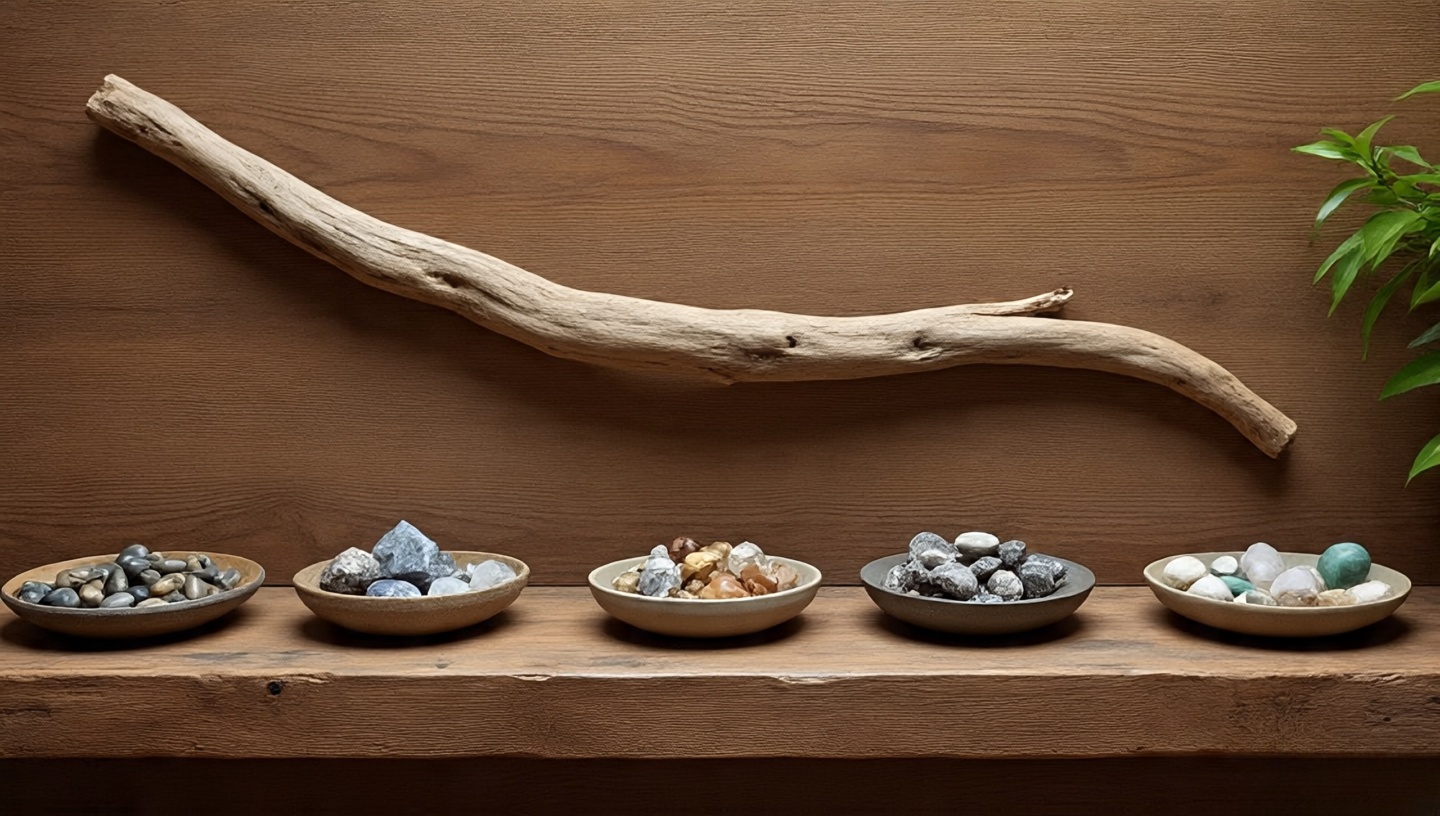
- Keep groupings odd-numbered (3 or 5).
- Use shallow bowls to contain smaller finds like pebbles or crystals.
30) Eclectic Bookshelves Half Library, Half Diary
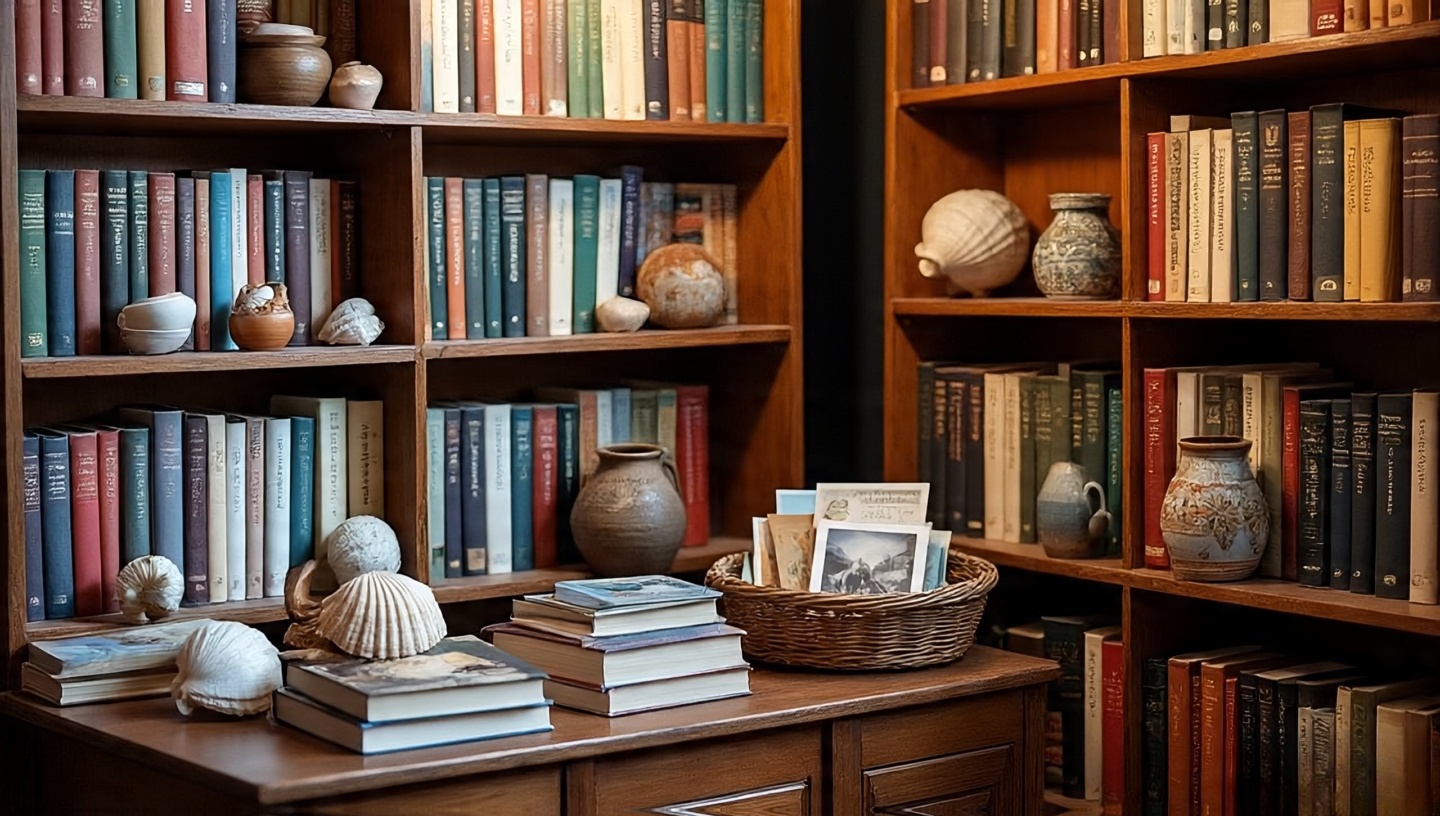
- Arrangement tip: Mix vertical rows with horizontal stacks. Place an object atop horizontal piles for rhythm.
- Color block: Group spines in muted tones for cohesion if your shelf feels too chaotic.
31) A Hammock Indoors Whimsy Meets Rest
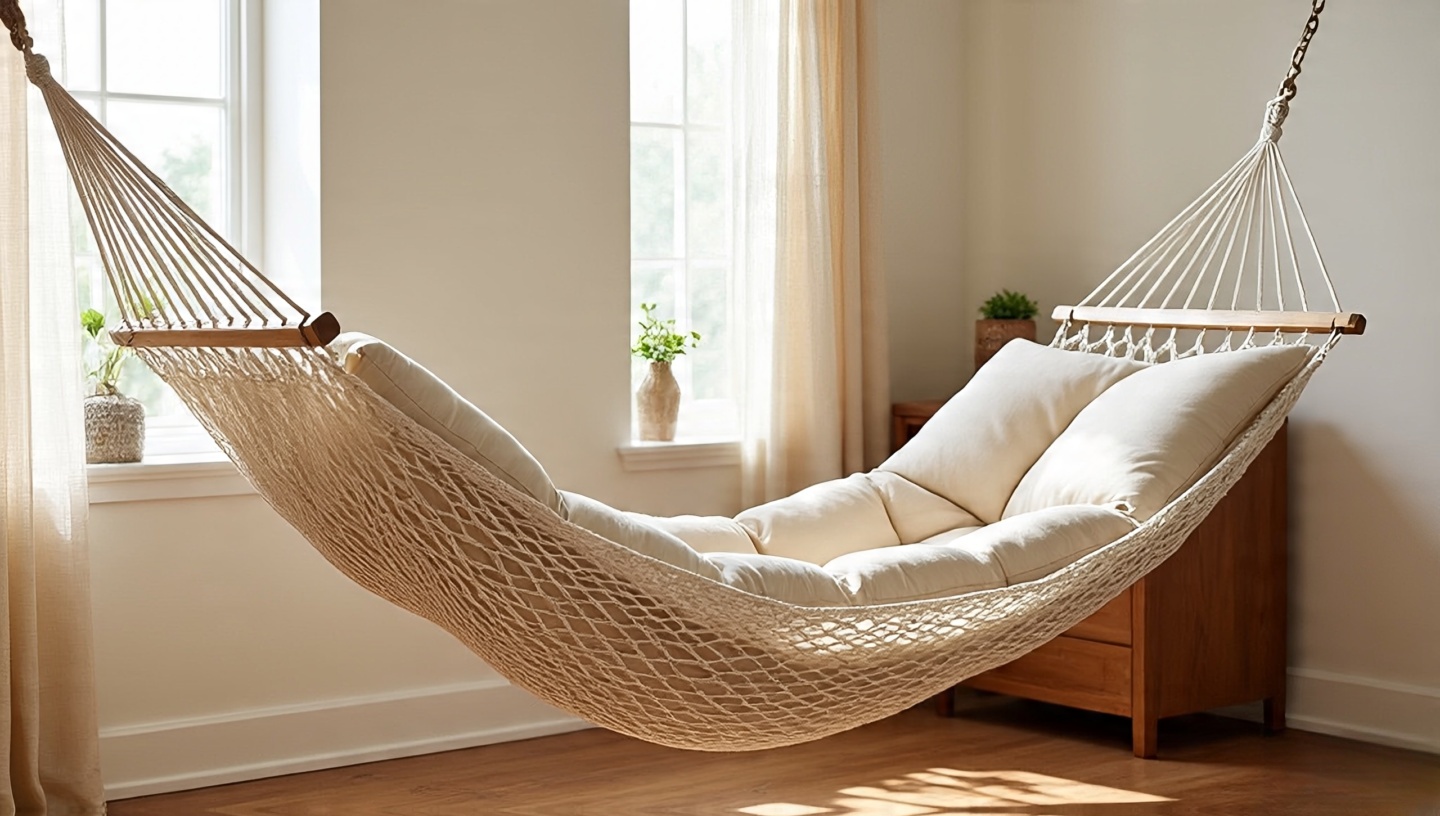
- Mounting: Anchor into studs or use a freestanding frame. Never trust drywall alone.
- Balance: Add a side table within reach; a hammock without somewhere to set tea quickly feels impractical.
32) Earth-Toned Walls Warmth Without Claustrophobia
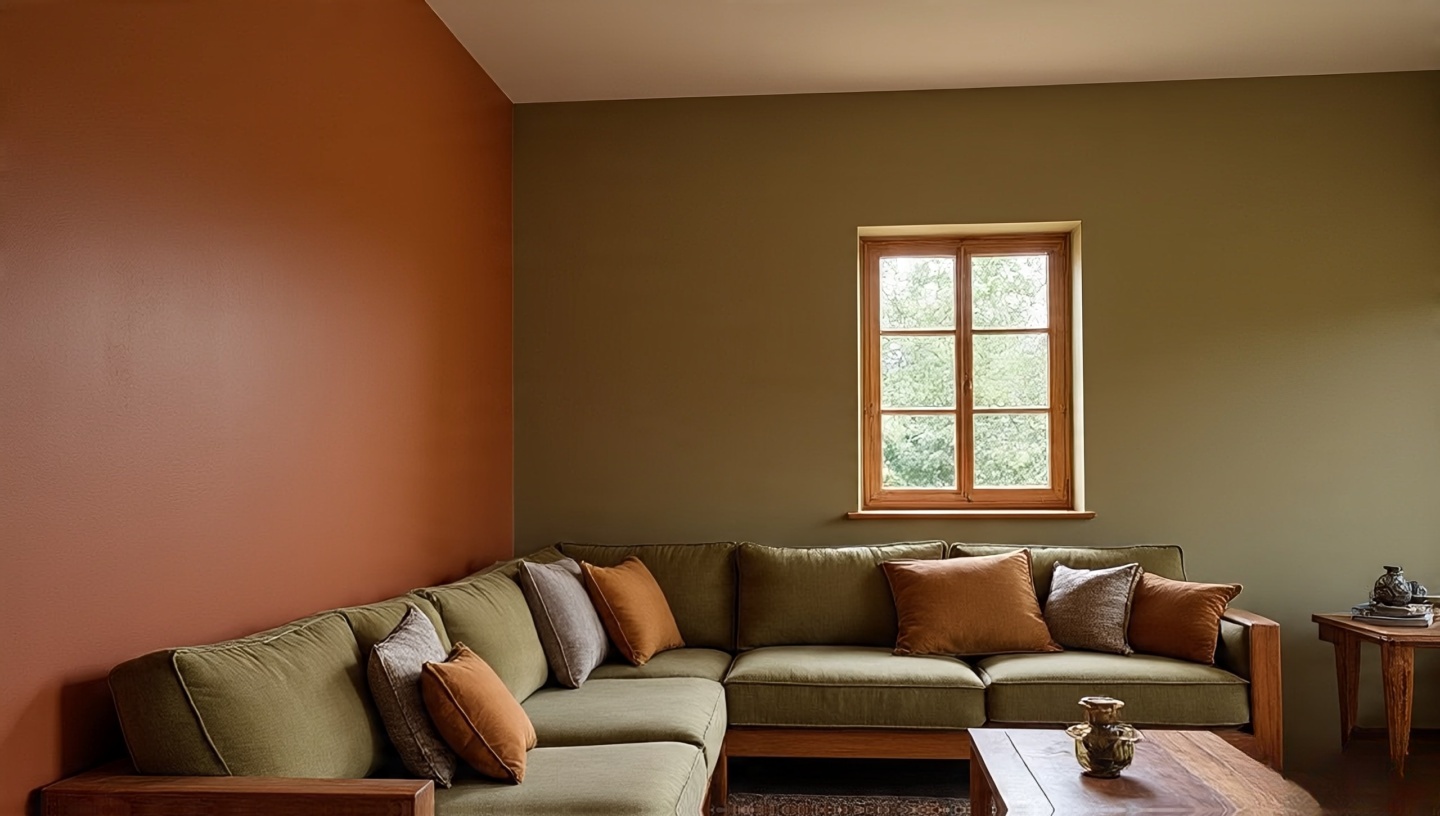
Architect’s rule: Use deeper tones on accent walls or lower halves, and let lighter neutrals carry the ceiling and trim.
33) Handmade Quilts Comfort in Layers
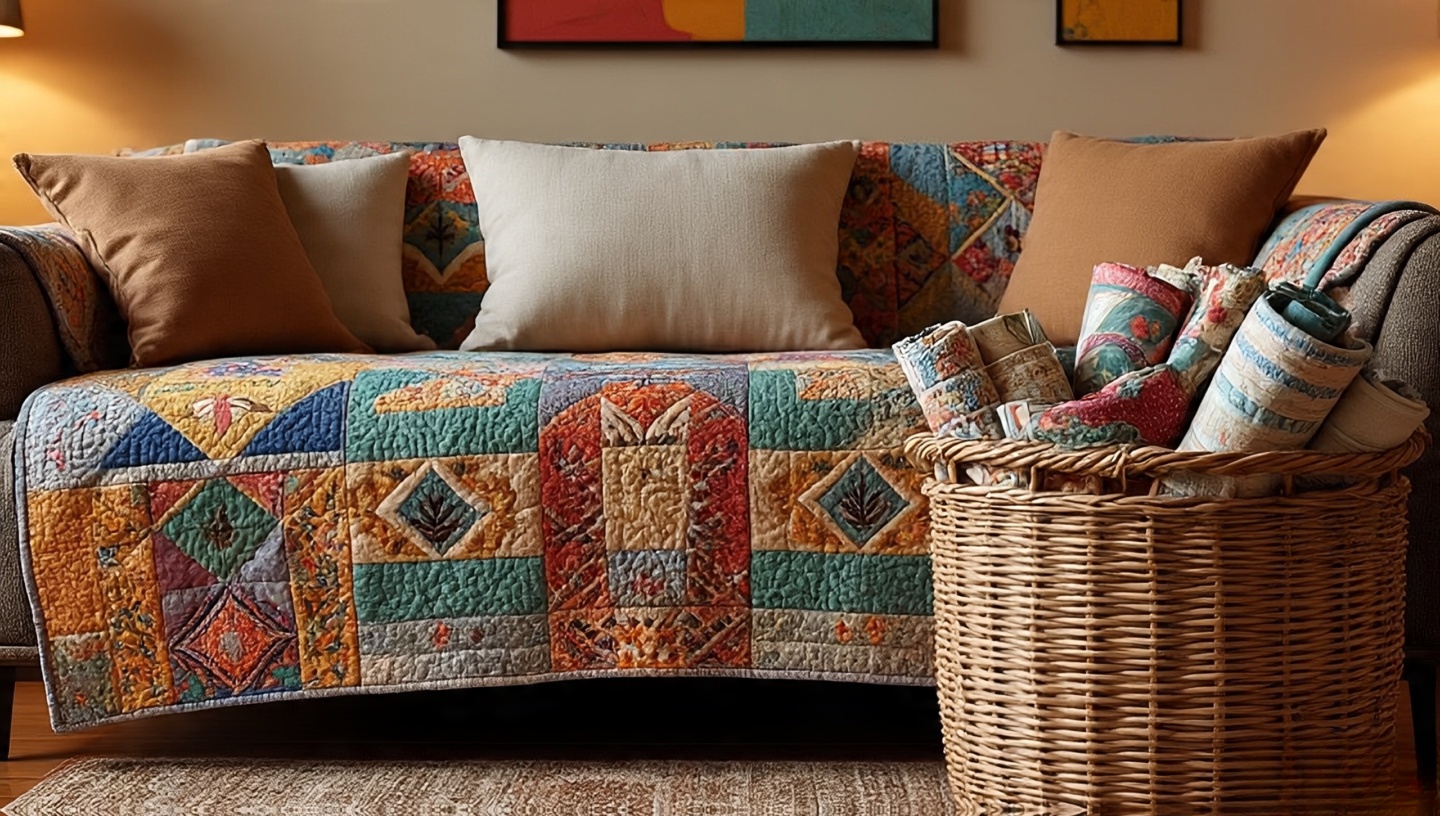
- Mixing: Pair a patterned quilt with solid pillows to avoid visual clutter.
- Storage: Roll quilts in baskets instead of folding flat; it keeps them ready and decorative.
34) Travel Souvenirs as Decor
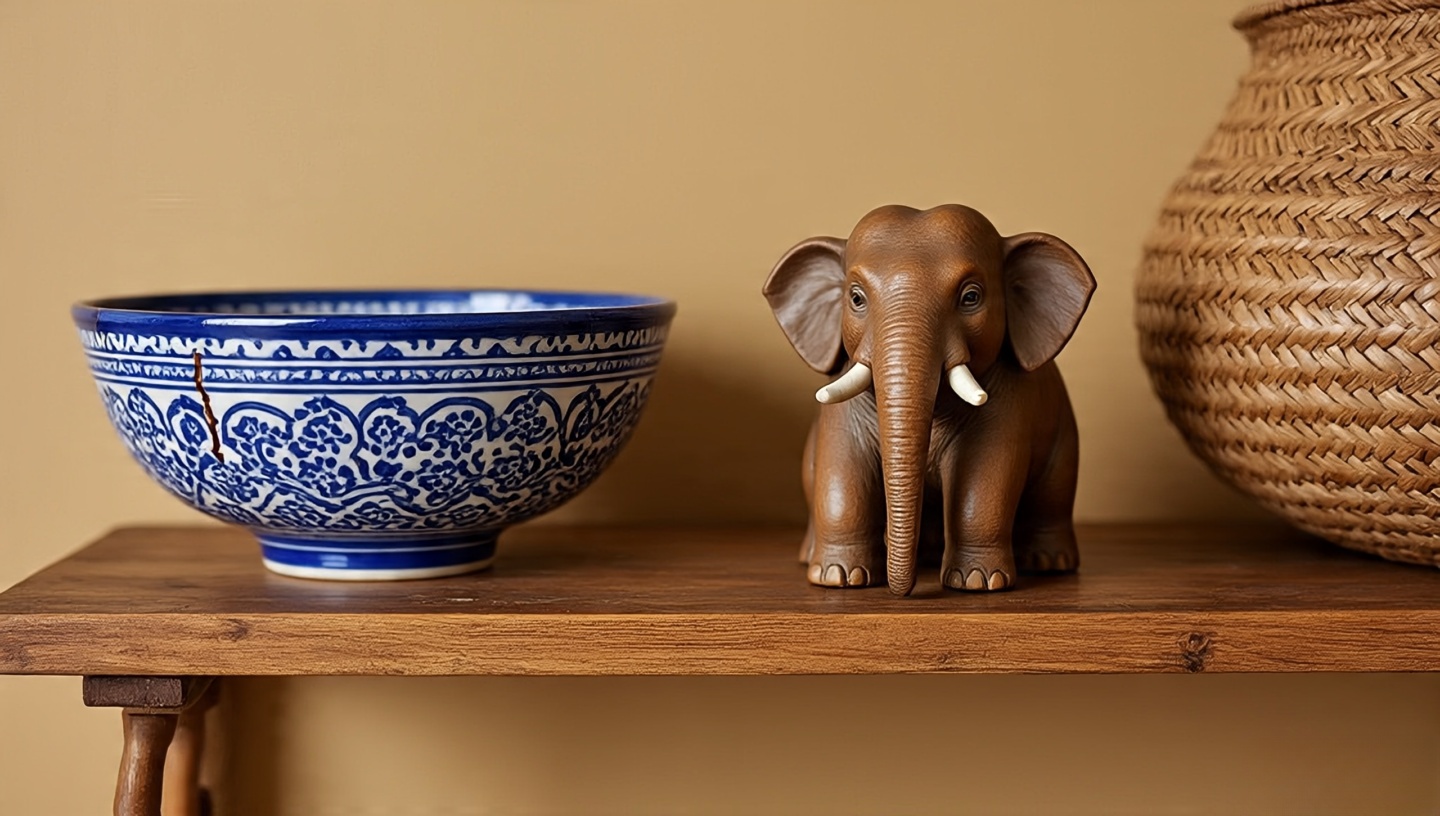
Architect’s insight: Cluster souvenirs in small vignettes rather than scattering randomly. Grouped stories read stronger than scattered noise.
35) Beaded Curtains Playful Movement
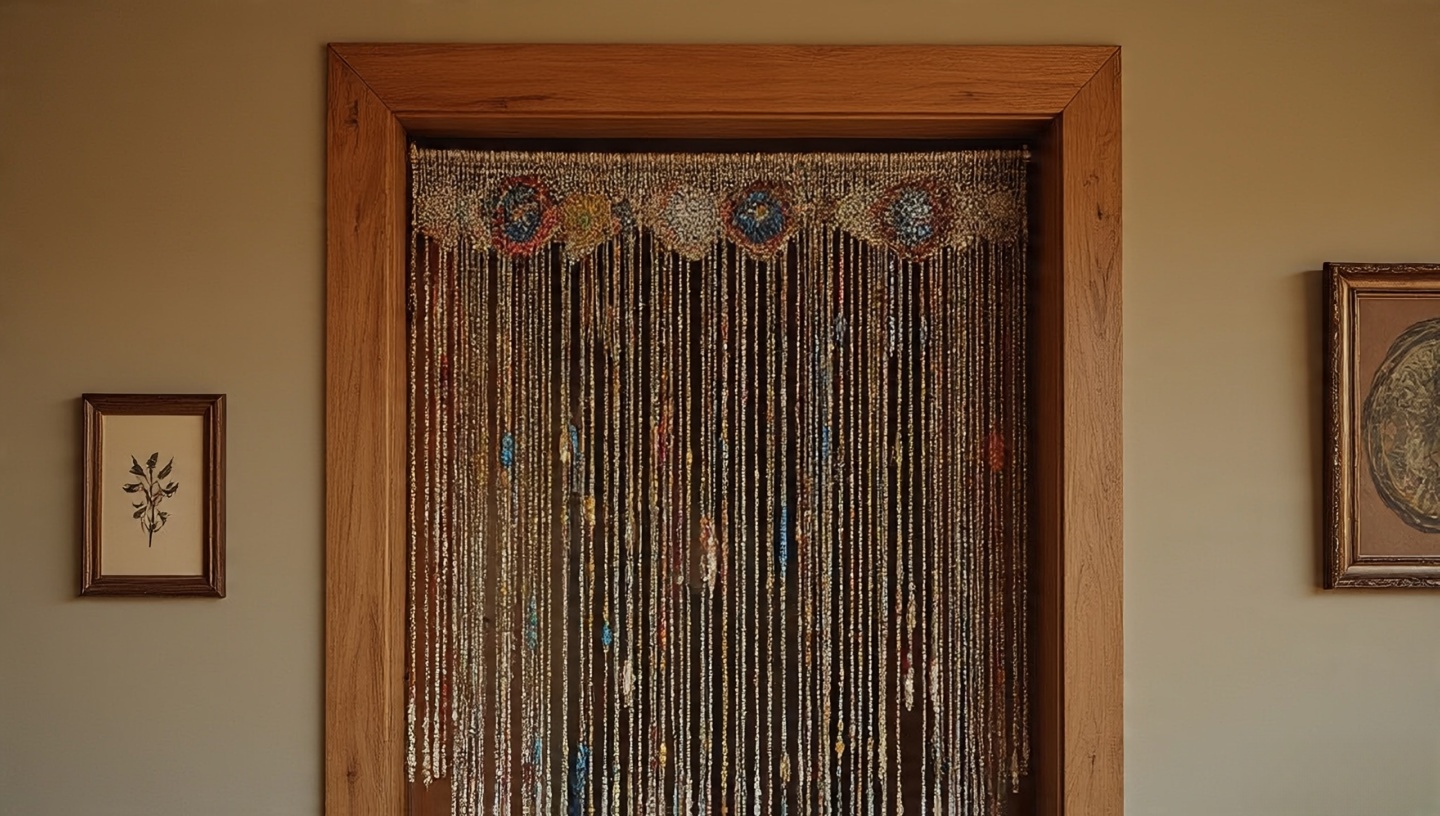
- Best used in secondary thresholds closets, pantries, or hallways where they feel playful, not intrusive.
- Pair with muted walls so the shimmer stands out.
36) Hand-Painted Ceramics Everyday Rituals Elevated
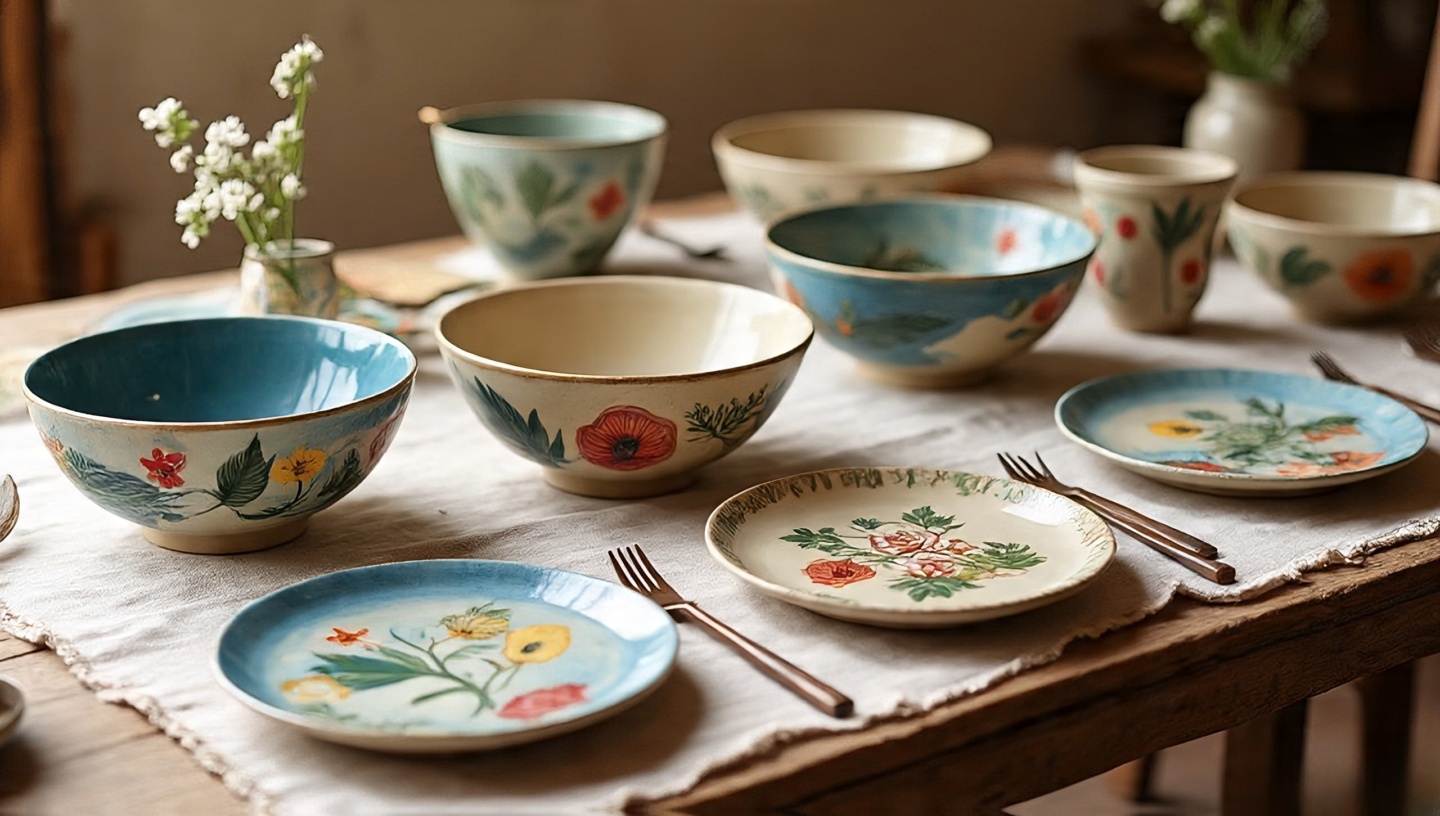
- Durability tip: Buy dishwasher-safe glazes if you want longevity in daily use.
- Mix one or two quirky patterns into otherwise simple dinnerware for balance.
37) Outdoor-Inspired Corners Nature Indoors
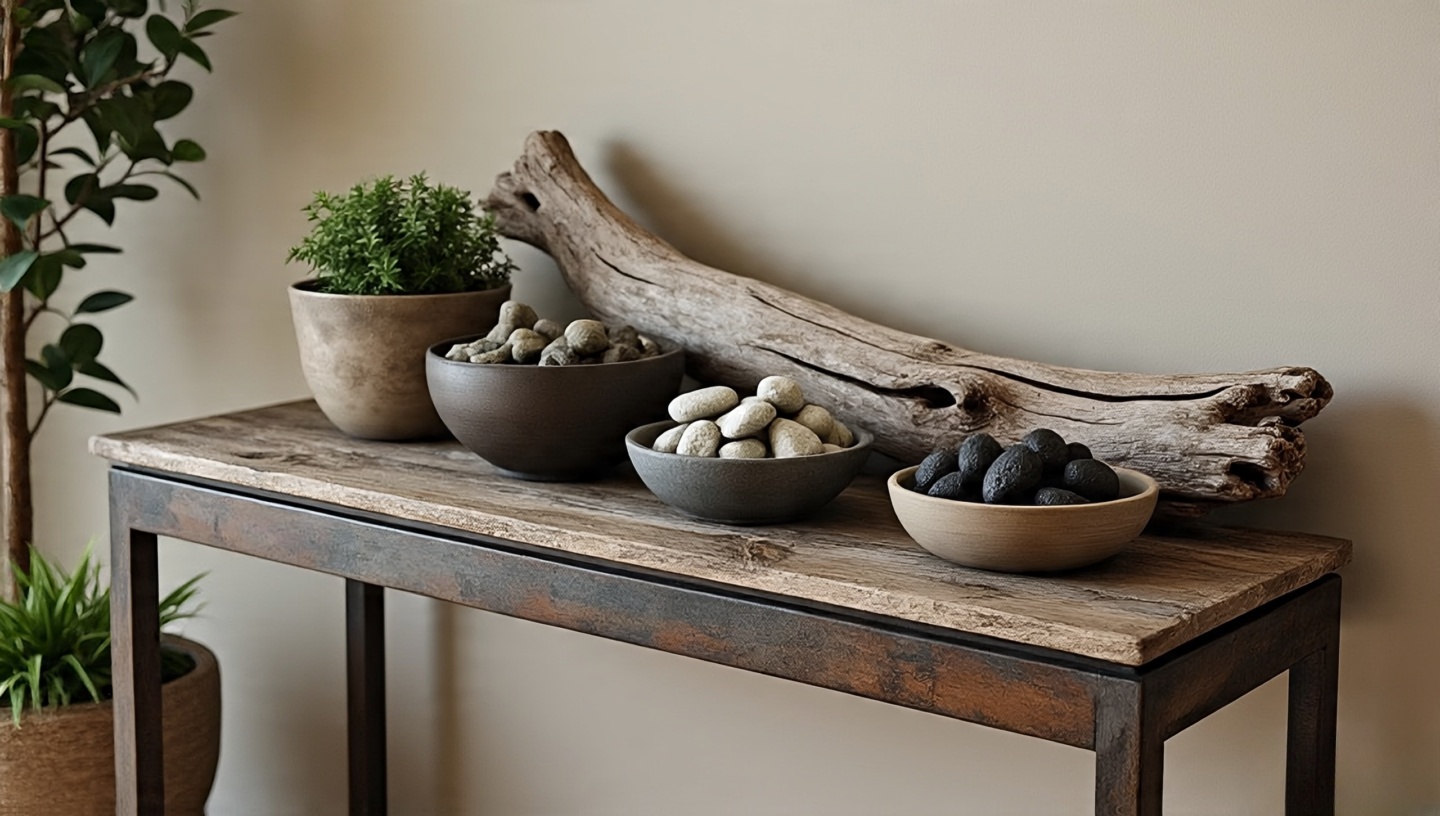
Pro note: Keep natural accents grouped, not scattered, to avoid looking like random clutter.
38) Overstuffed Sofas Comfort First
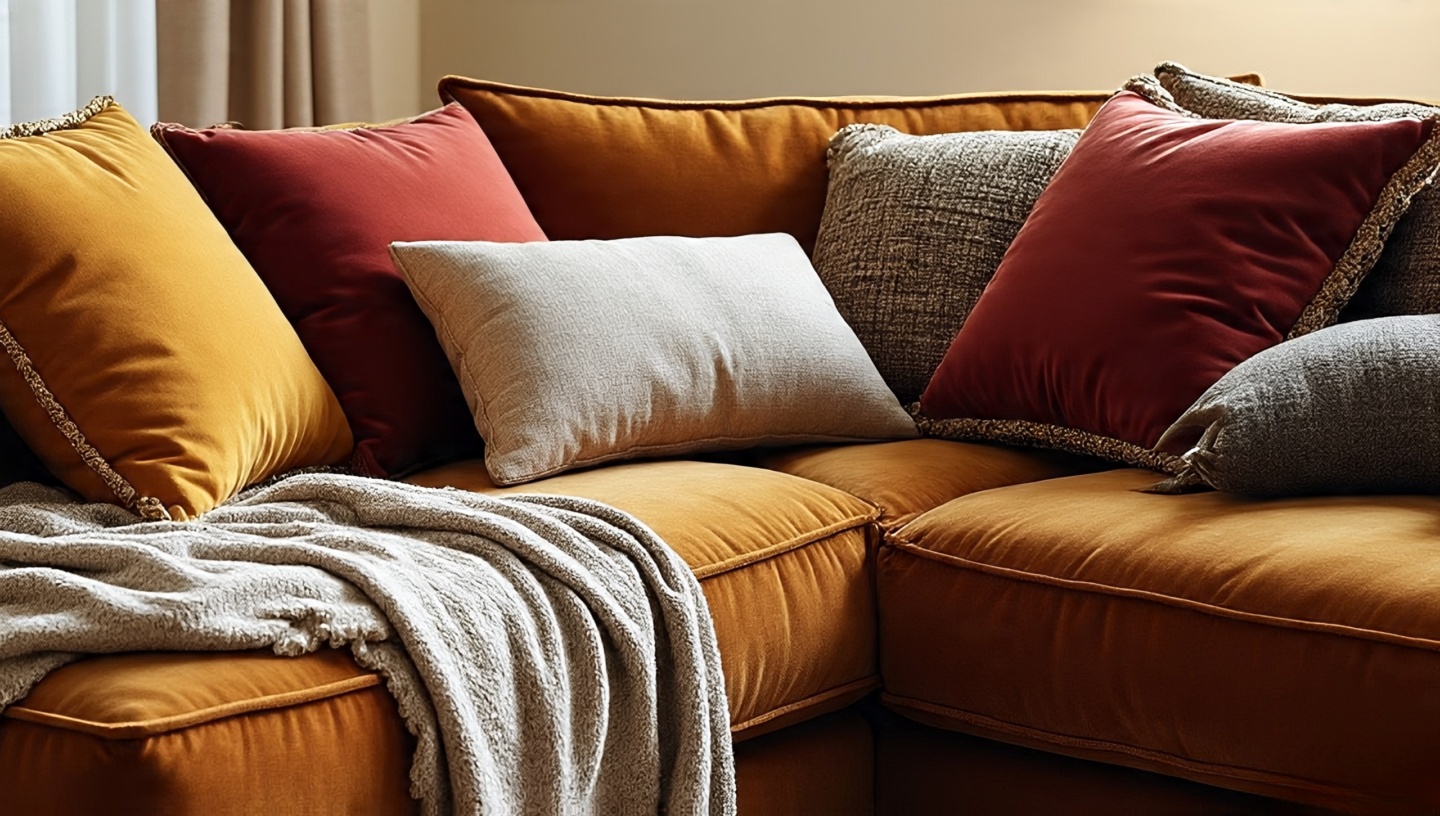
- Depth matters: 90–100 cm seat depth allows lounging without perching.
- Texture rule: one smooth (linen, cotton) + one plush (velvet, chenille) + one rugged (wool, kilim).
39) Hanging Chairs Suspended Retreats
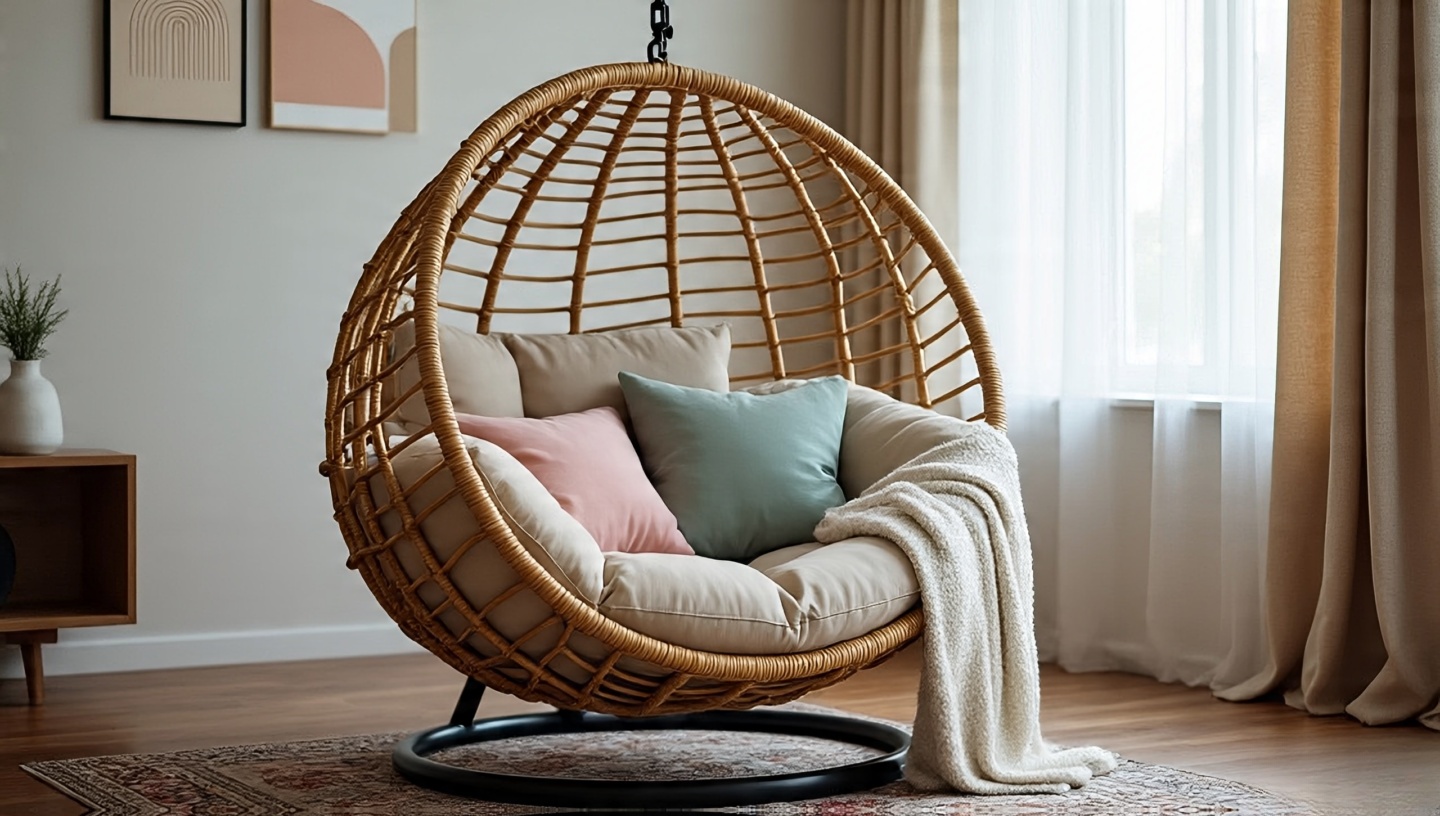
- Clearance: Leave at least 80 cm of space behind and beside to allow sway without bumping walls.
- Anchor safely: Ceiling joist, never just plasterboard.
40) Boho Bathrooms Sanctuary in Small Spaces
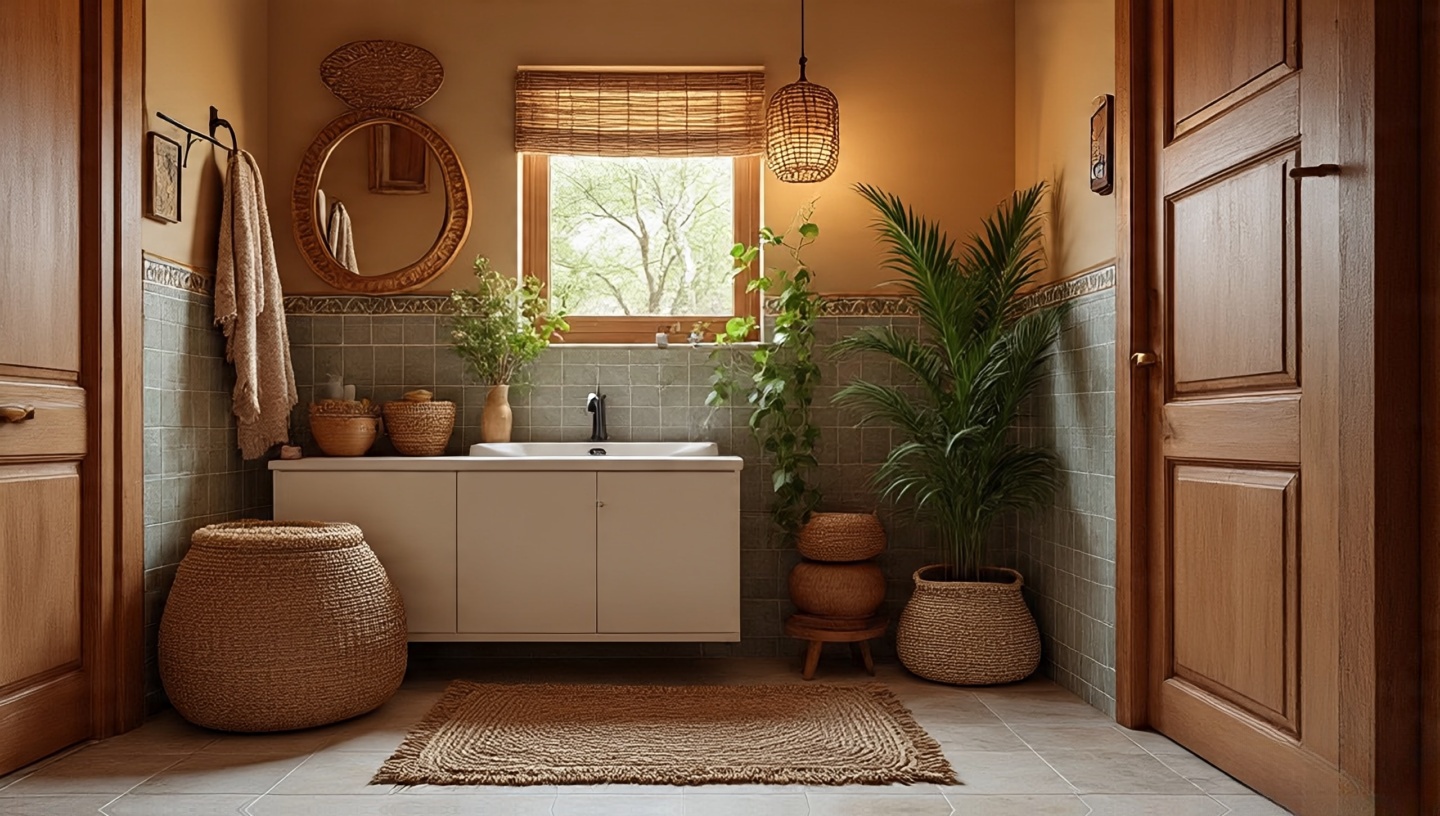
Architect’s tip: For small bathrooms, keep the palette earthy but light sandy beige walls with patterned accents prevent the space from closing in.
41) Layered Bedding A Cloud You Can Sink Into
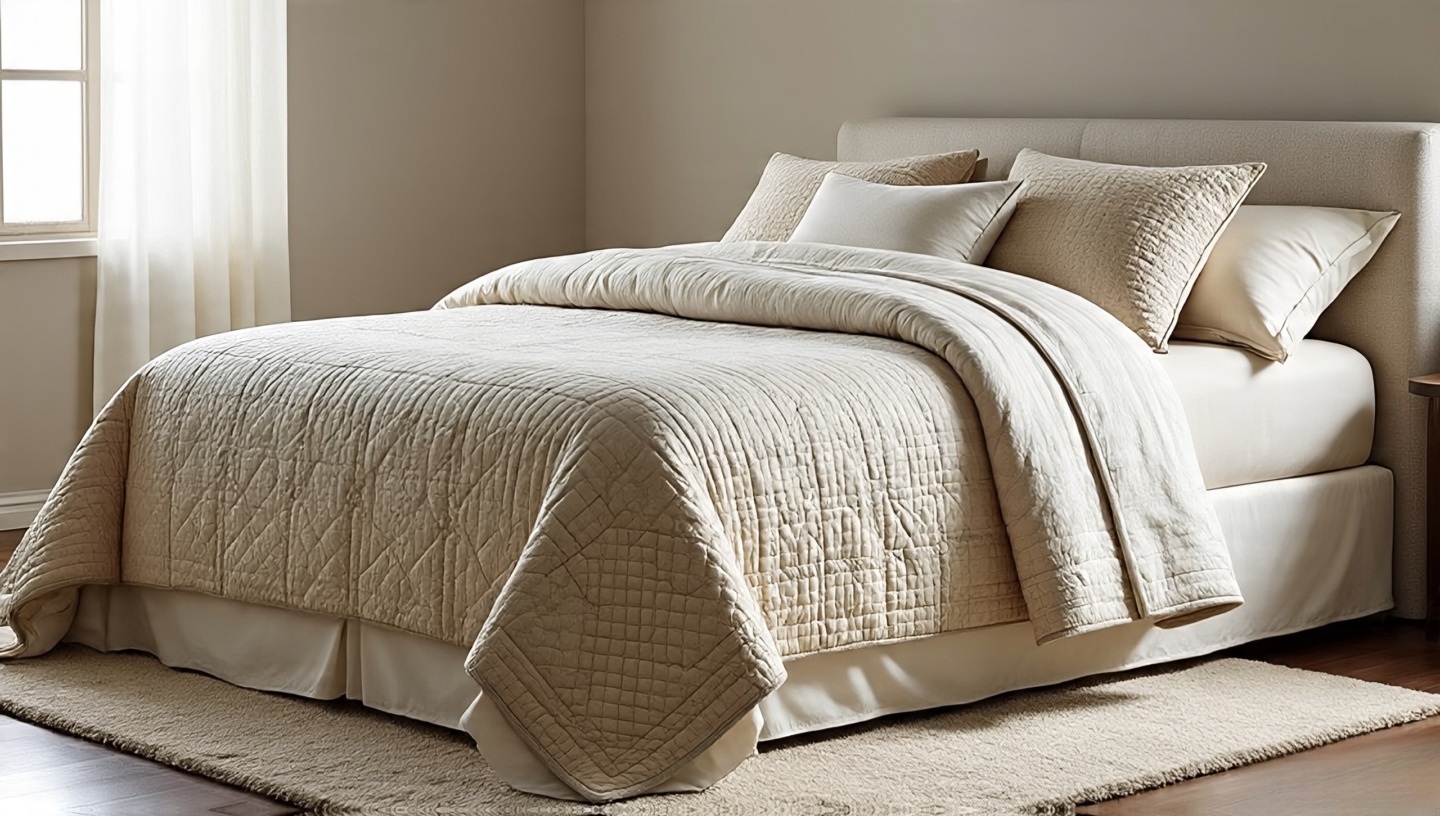
- Layer rule: 1 quilt base + 1 textured throw + 3–5 cushions in varied sizes creates depth.
- Tip: Use contrasting fabrics linen for breathability, velvet for richness.
Architect’s note: Keep tones within one palette (earthy, jewel, or neutral) to avoid chaos.
42) Art That Feels Personal Not Just Purchased
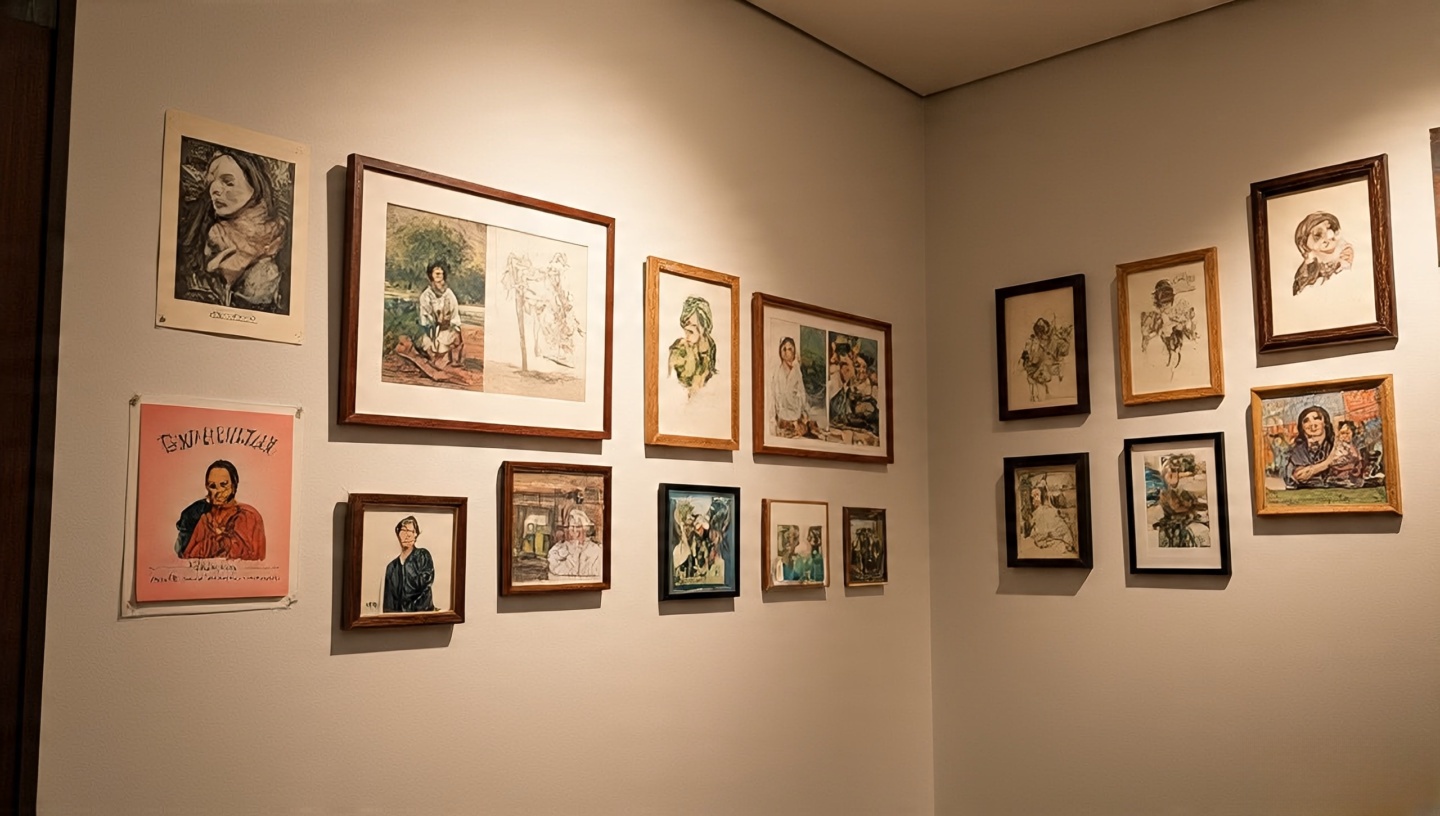
Advice: Frame casually, even with mismatched frames. Authenticity beats uniformity every time.
43) Tribal Prints Visual Rhythm for the Room
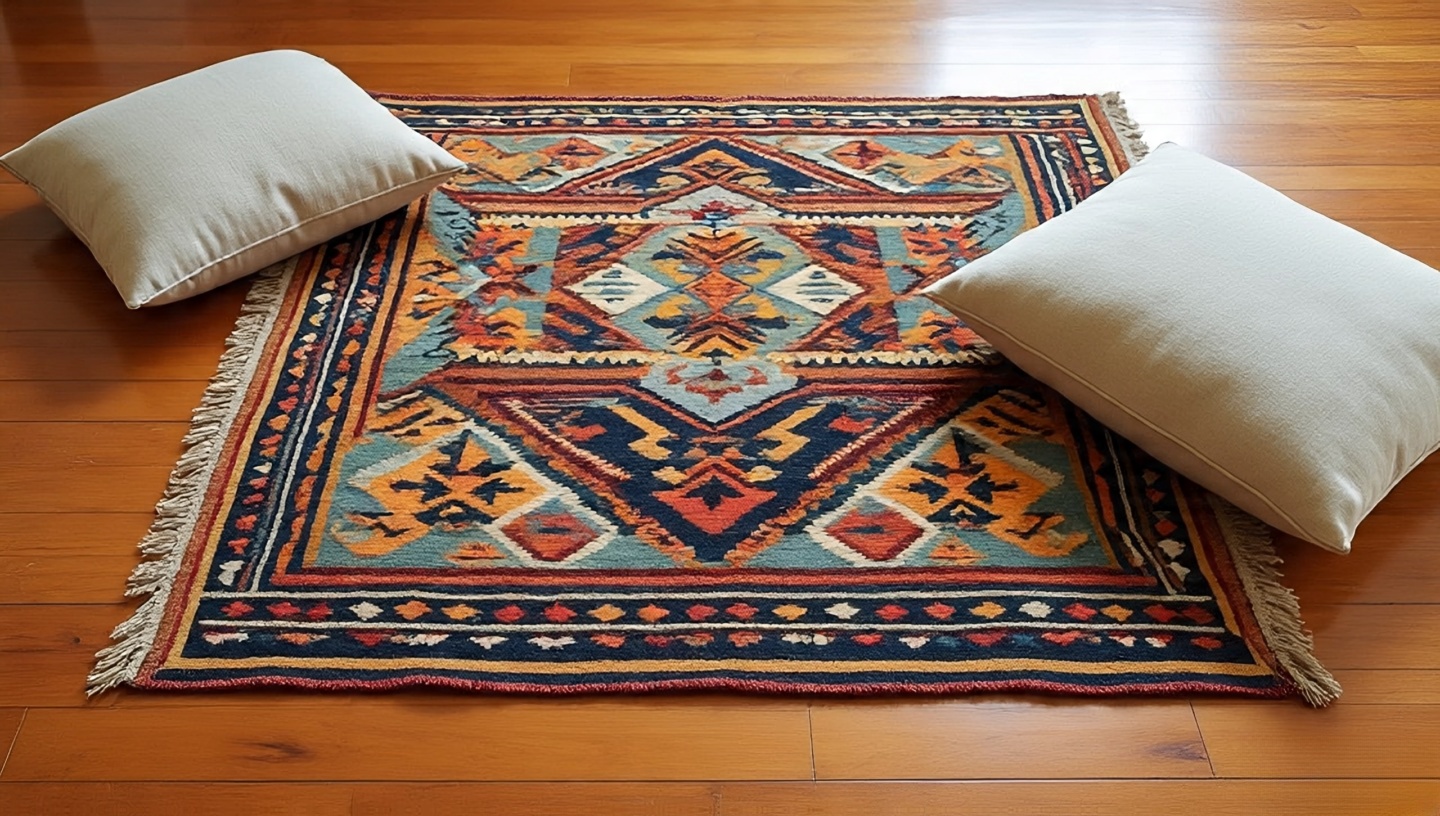
- Pairing tip: Anchor one tribal print with plainer textures around it. Too many and you drown the rhythm.
44) Sunlit Windows with Sheers Softened Glow
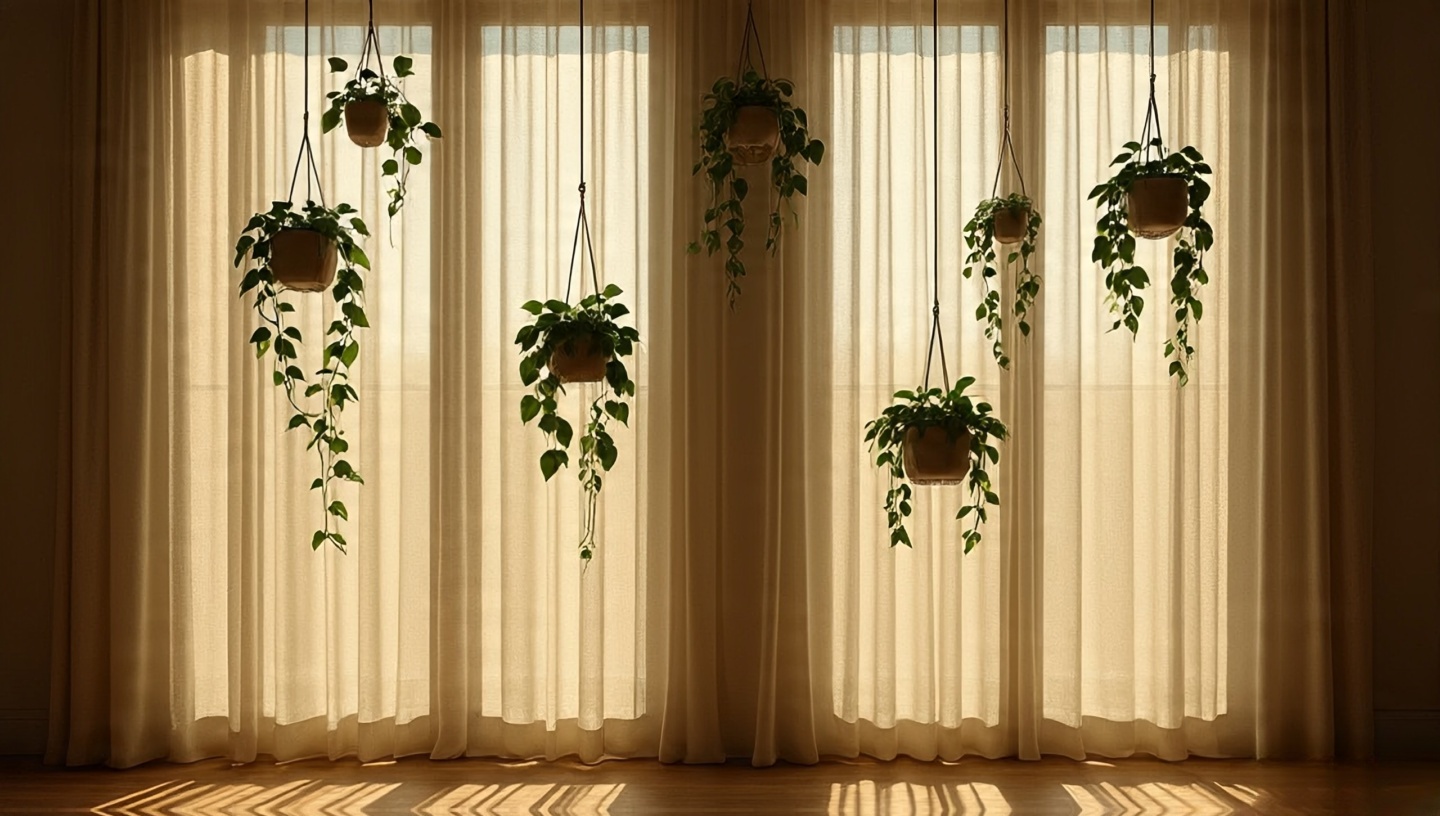
Pro tip: Avoid polyester sheers; cotton or linen moves with breeze naturally and photographs beautifully.
45) Wall Shelves with Oddities Curiosity on Display
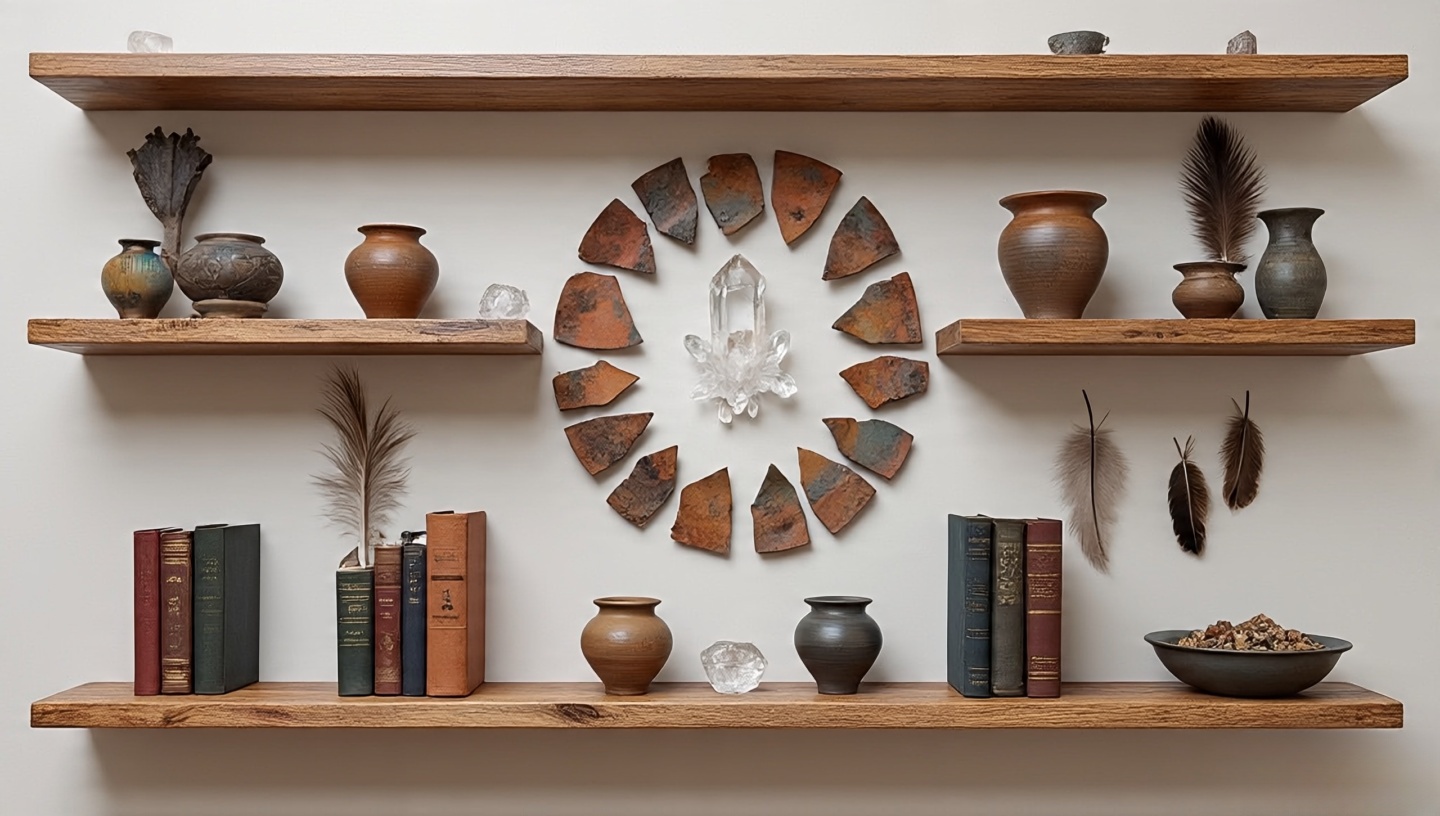
- Architect’s guidance: Mix vertical books with small artifacts. Too many objects of the same scale flatten the rhythm.
46) Pops of Jewel Tones Accent Energy
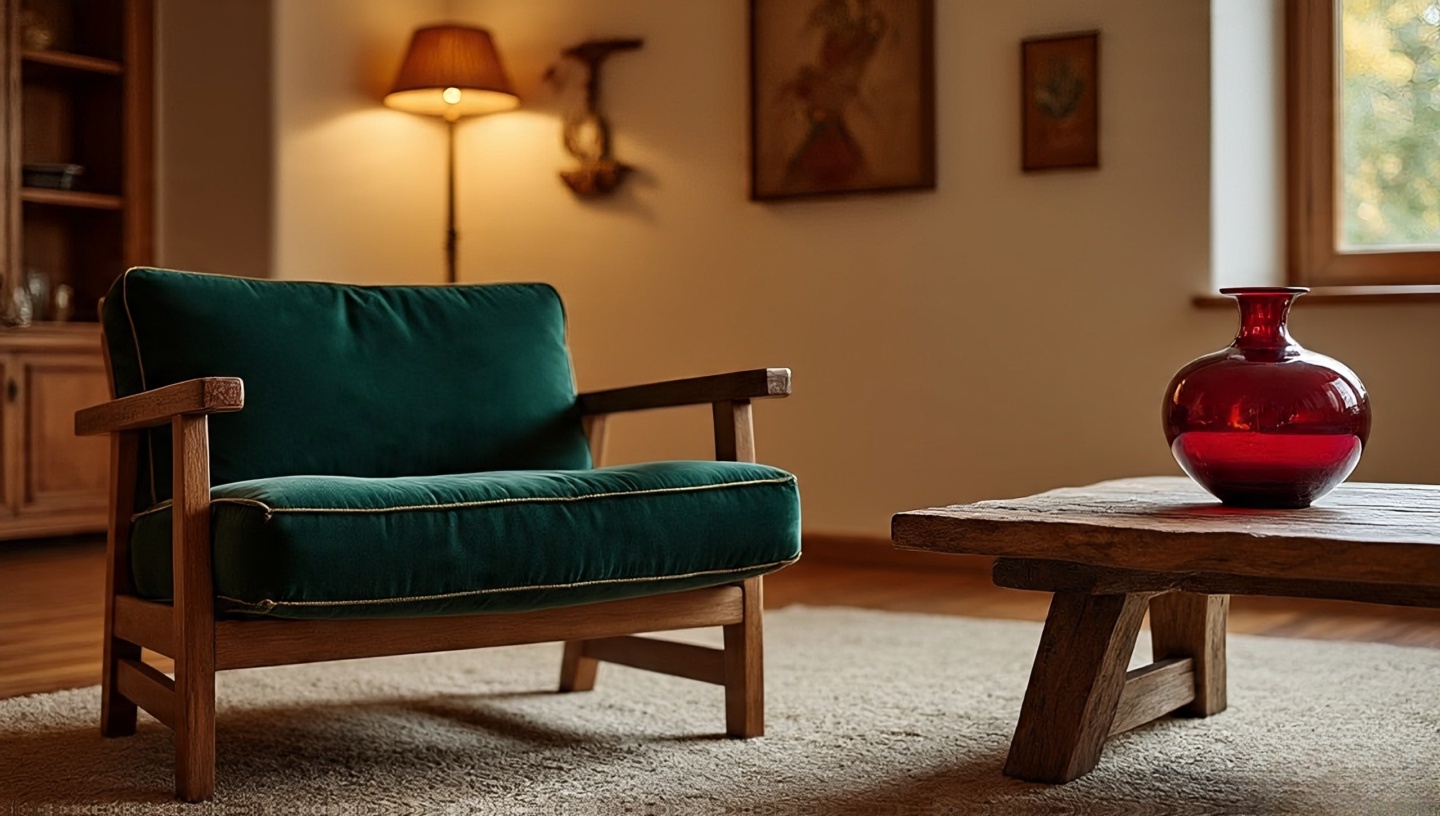
- Tip: Add one jewel-tone cushion or vase per zone. Think seasoning, not main dish.
47) Rugs on Walls Texture at Eye Level
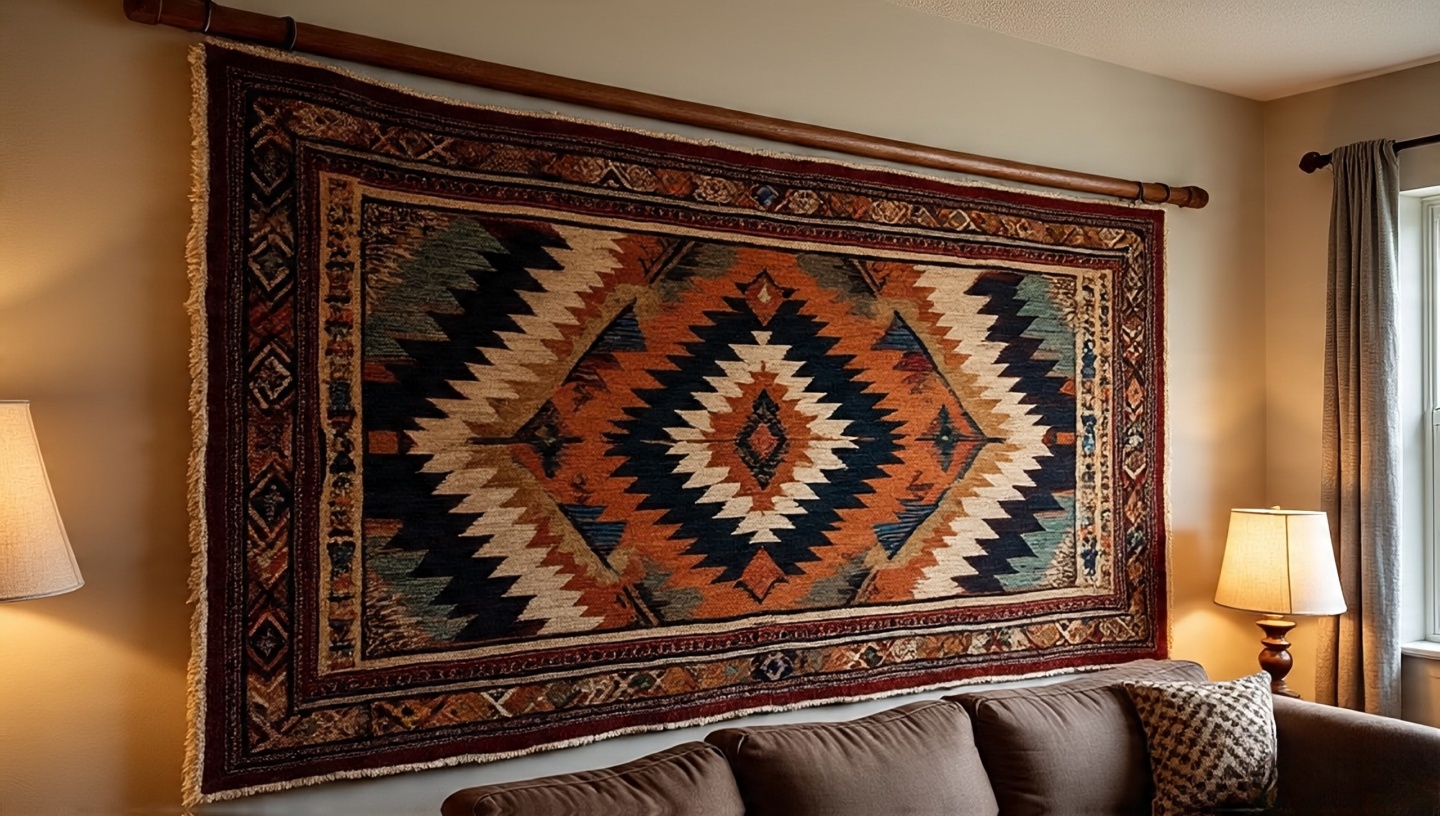
Architect’s note: Use a proper tapestry rod or Velcro strip never nails. It preserves the weave and weight.
48) A Patchwork of Textures Touch Invites Connection
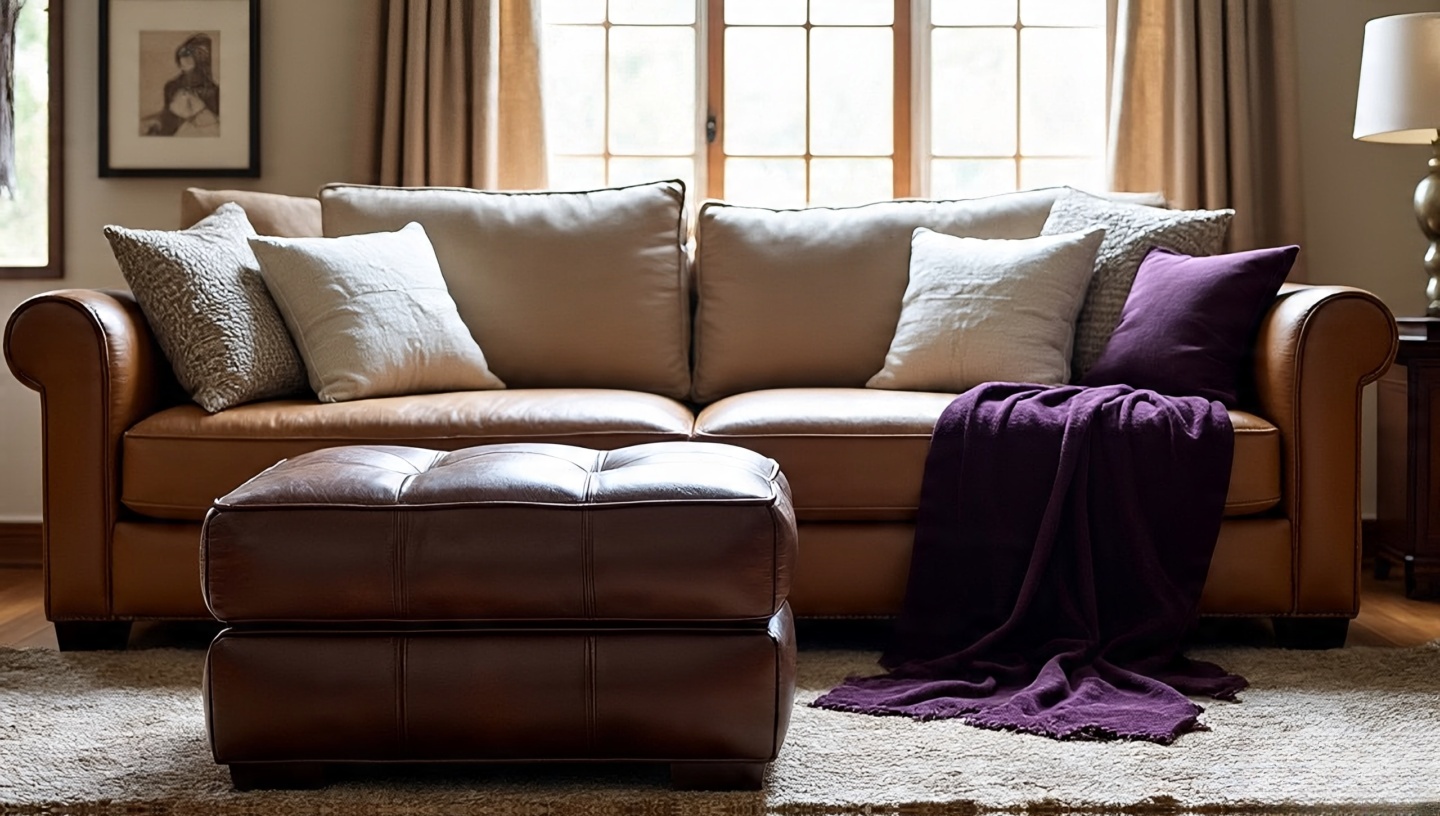
- Balance smooth with rough, shiny with matte.
- Place high-touch textures (velvet, wool) where hands naturally land armrests, cushions.
49) Global-Inspired Kitchens Spices and Soul
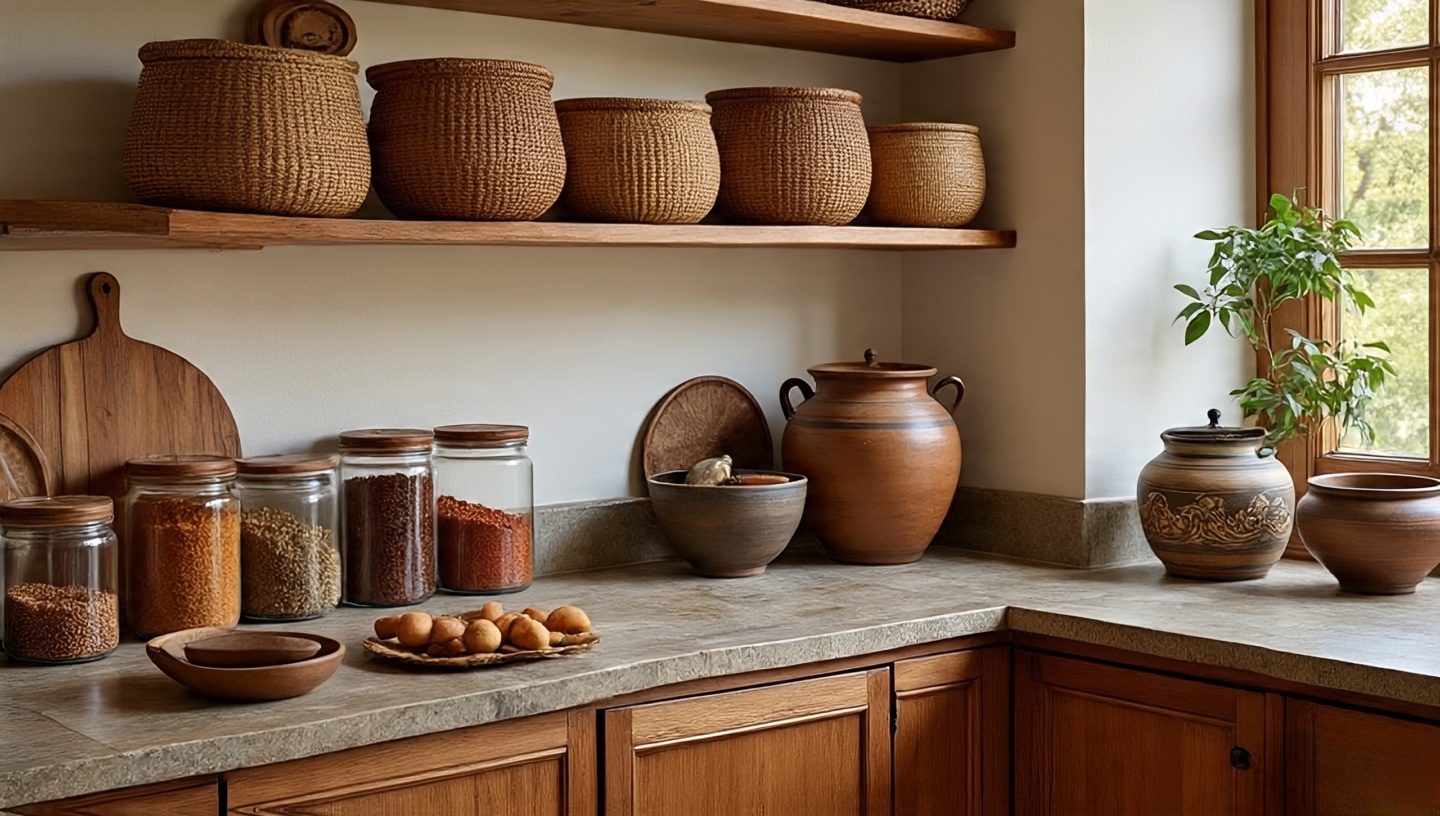
Tip: Open shelving works best here visual access is part of the aesthetic. Keep jars and ceramics in earthy tones to prevent chaos.
50) A Spirit of Freedom The Real Boho Secret
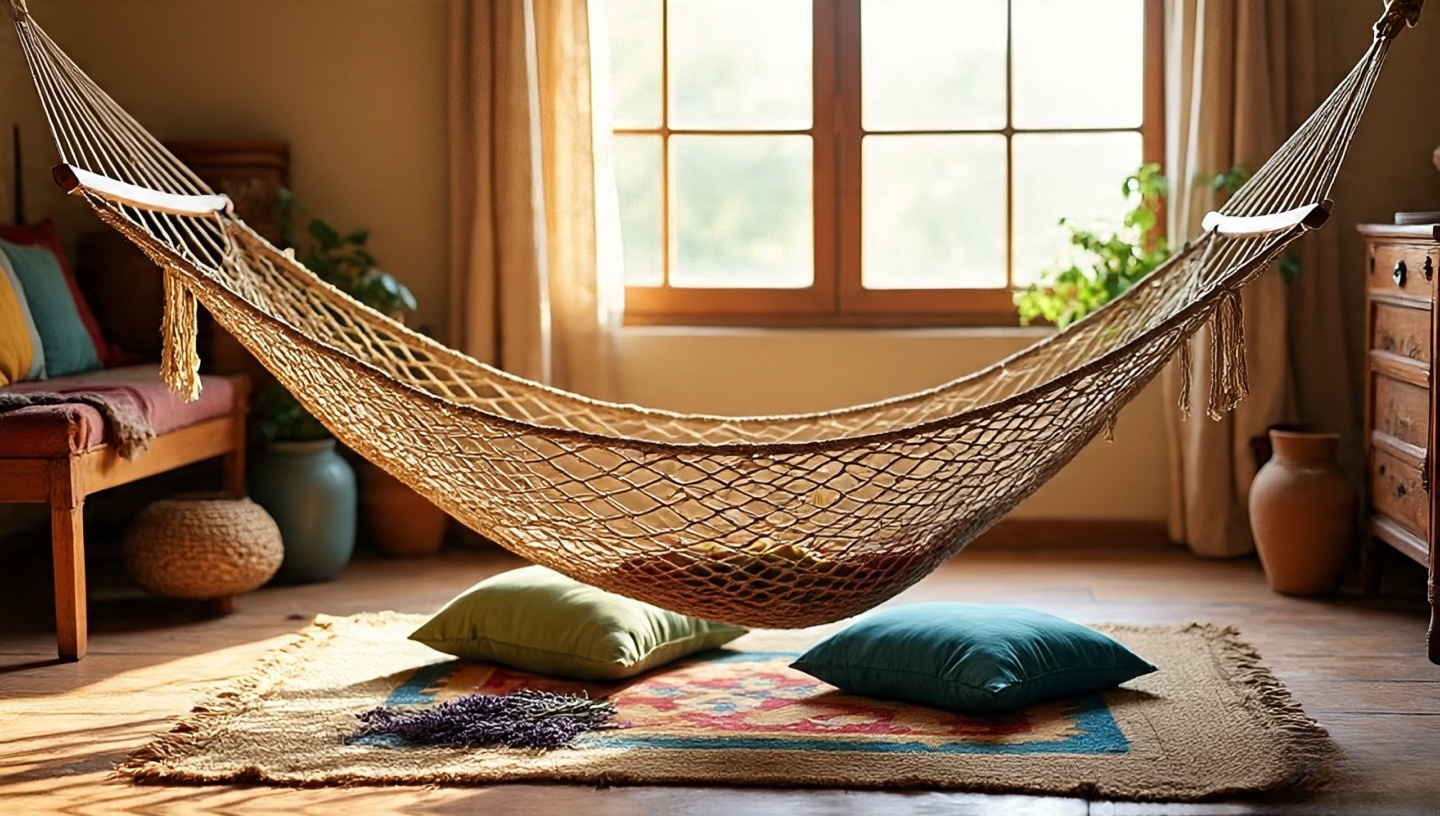
Architect’s closing thought: A good Boho home doesn’t look staged. It feels like a life being lived messy, layered, beautiful, and personal.
Final Reflections
Reading through 50 ideas might feel overwhelming, but Boho style isn’t a checklist it’s a mindset. It’s about listening to what makes your heart feel cozy and your eyes light up. Try just one or two ideas: maybe add a tapestry, light a cluster of candles, or layer your bedding tonight. Notice how it feels. Home should be personal, imperfect, and full of soul. That’s the real Bohemian secret.
